No Way In
 |  |
| Final Fantasy IV (Super Famicom) | Final Fantasy II (Super NES) |
When you first enter Mt. Ordeals, a little text box pops up to say where you are.
In English, it says, “Mt. Ordeals”.
In Japanese, it says something like, “Mountain of Ordeals – Entrance”.
I would’ve thought the expanded text box could hold the extra words, but I guess not.
Icy Hot
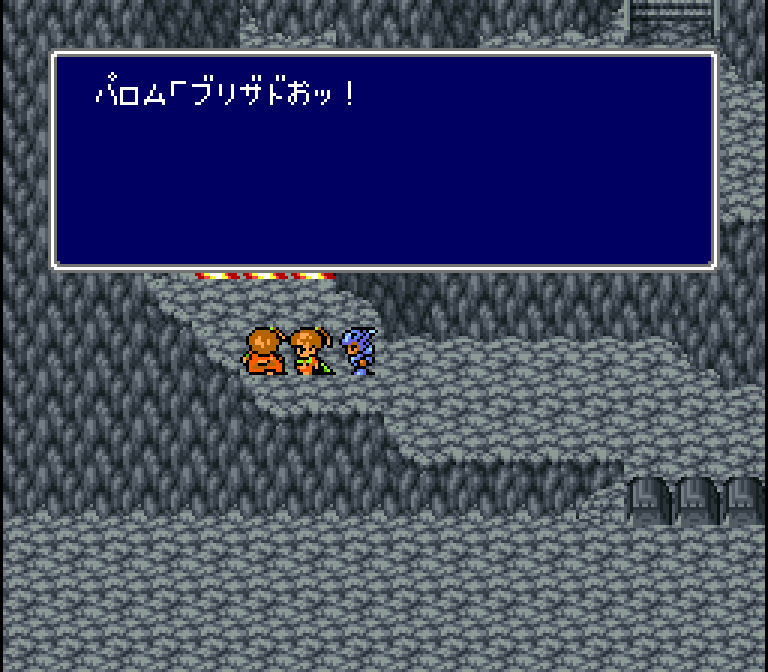 | 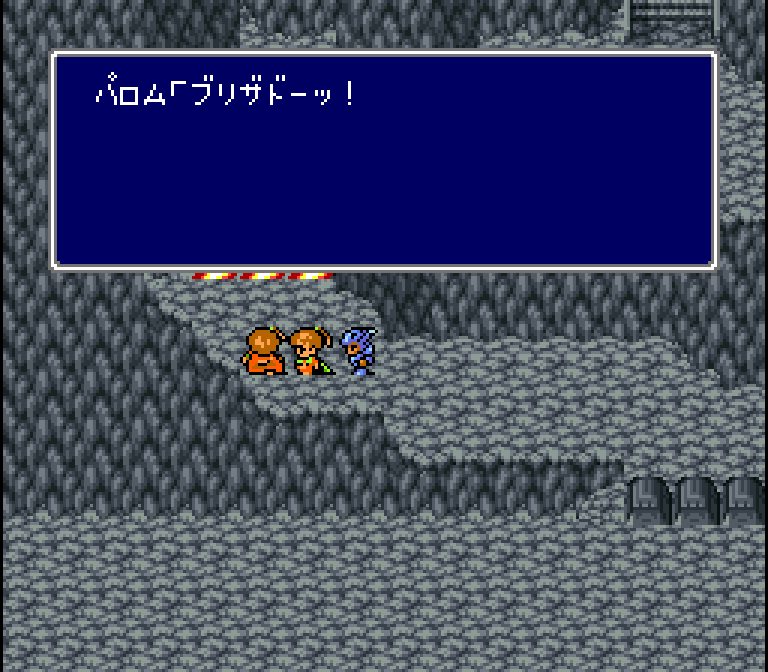 |  |
| Final Fantasy IV (Super Famicom) | Final Fantasy IV Easy Type (Super Famicom) | Final Fantasy II (Super NES) |
Palom uses a spell to clear away the flames at the base of Mt. Ordeals.
In Japanese, Palom yells, “Blizzard!”
In English, the line is instead, “Ice!”
This is of course because the “Blizzard” spell in Final Fantasy IV was renamed “Ice” in English.
Also of note is that Final Fantasy IV and Final Fantasy IV Easy Type write this line slightly differently. The lines are pronounced the same, just written a tiny bit differently. I guess someone didn’t like the unusual aesthetic of the original line.
Good Times
 | 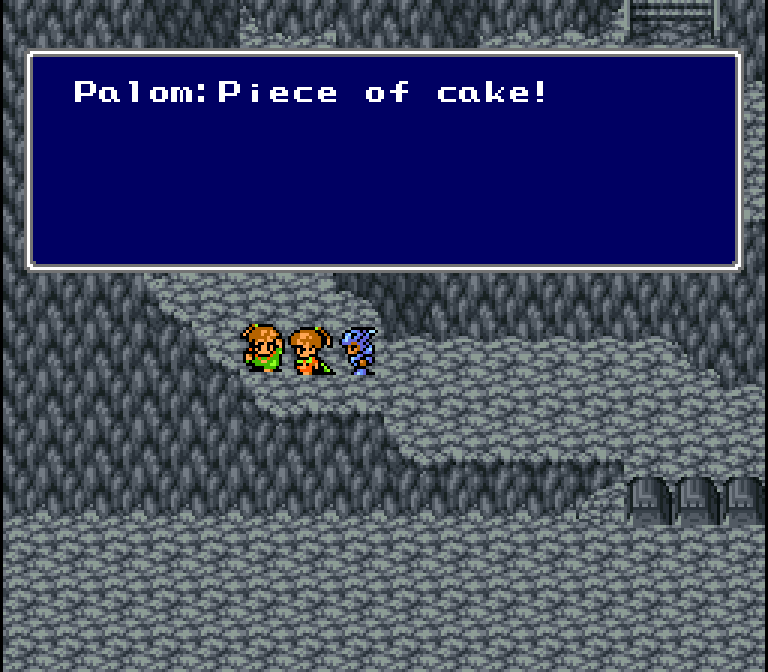 |
| Final Fantasy IV (Super Famicom) | Final Fantasy II (Super NES) |
I’ve noticed that, at least at this part of the game, the translation/localization has improved quite a bit. I really think most of the Mt. Ordeals stuff got some extra attention, possibly from a native English speaker at some point.
A quick example is this line that even I would’ve translated as “Piece of cake!” I was happily surprised when I saw that that was how Final Fantasy II actually phrased it.
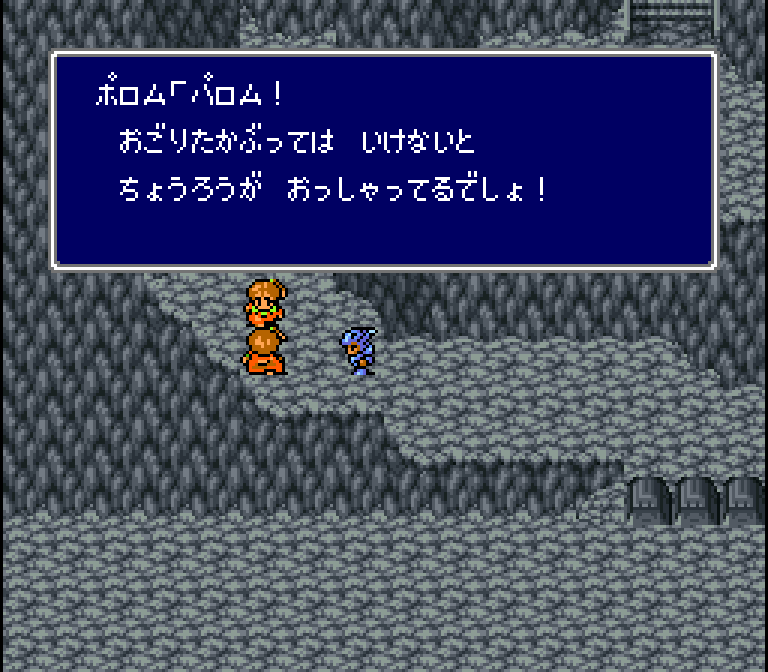 | 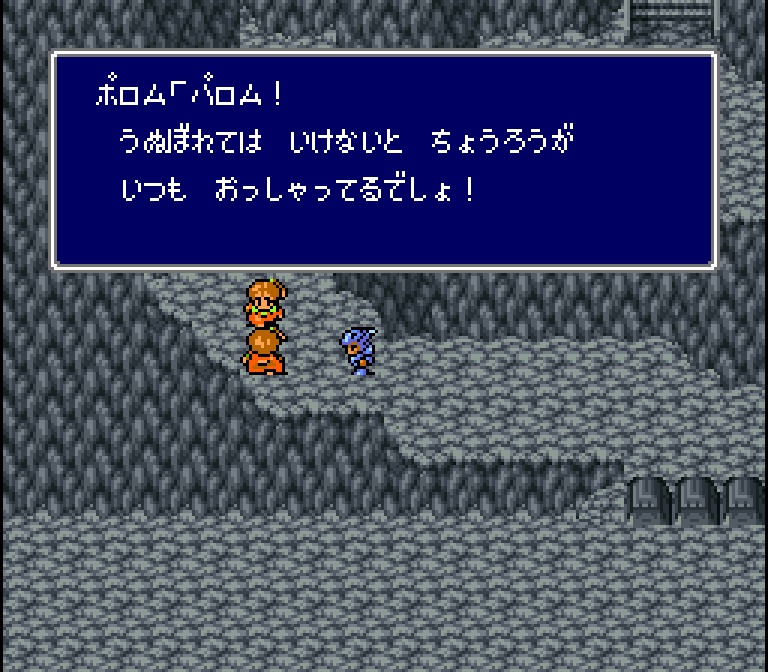 | 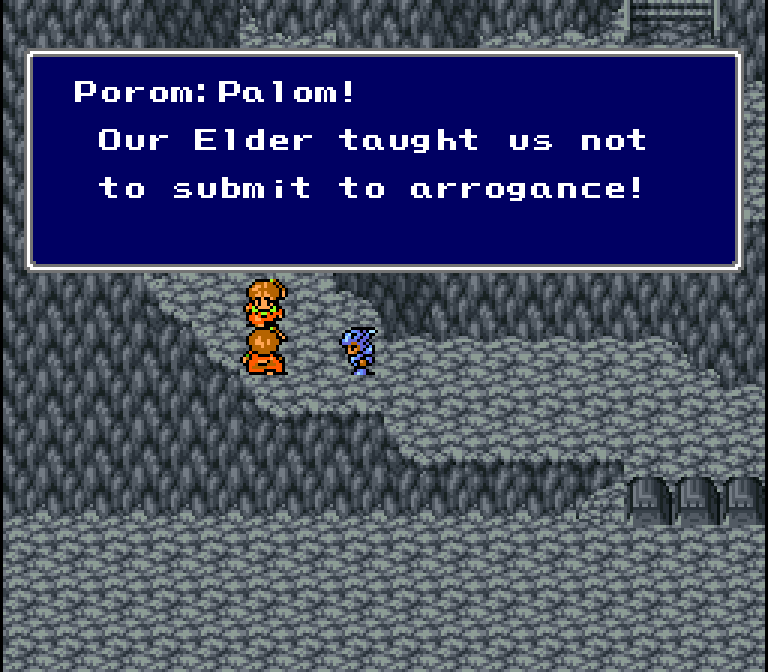 |
| Final Fantasy IV (Super Famicom) | Final Fantasy IV Easy Type (Super Famicom) | Final Fantasy II (Super NES) |
There’s a line after the blizzard scene that was slightly changed in Final Fantasy IV Easy Type:
| Final Fantasy IV (basic translation) | Final Fantasy IV Easy Type (basic translation) | Final Fantasy II (Super NES) |
| Porom: Palom! You know full well that the elder says we shouldn’t act haughty! | Porom: Palom! You know full well that the elder says we shouldn’t be arrogant! | Porom: Palom! Our Elder taught us not to submit to arrogance! |
So Final Fantasy IV Easy Type’s text underwent another slight simplification. There’s also a case of unusual capitalization in the English translation, but that’s becoming so commonplace by now that I probably won’t mention them every time anymore.
Look Out Below!
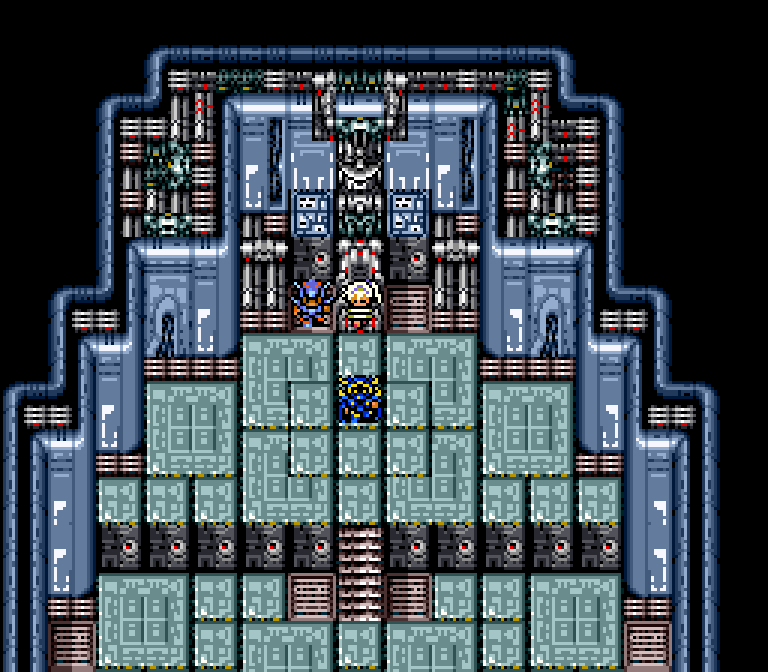 | 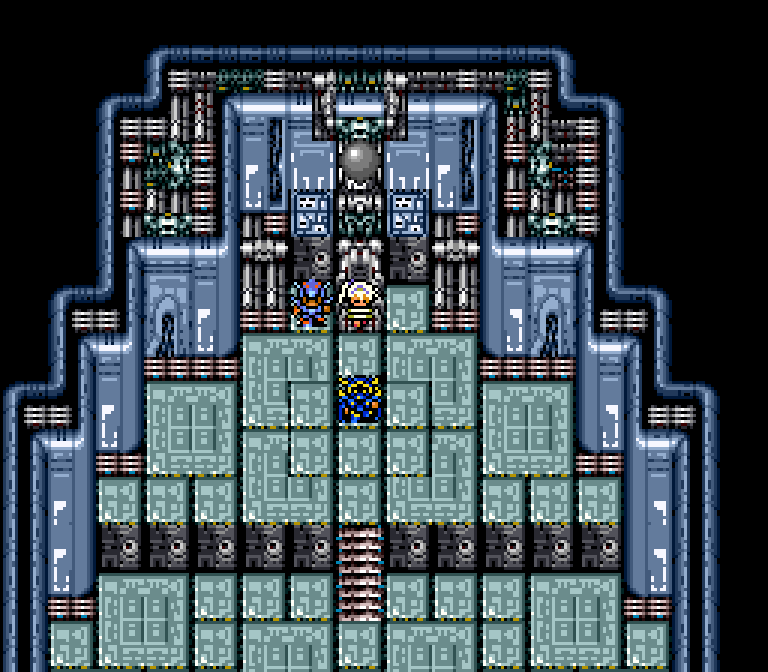 | 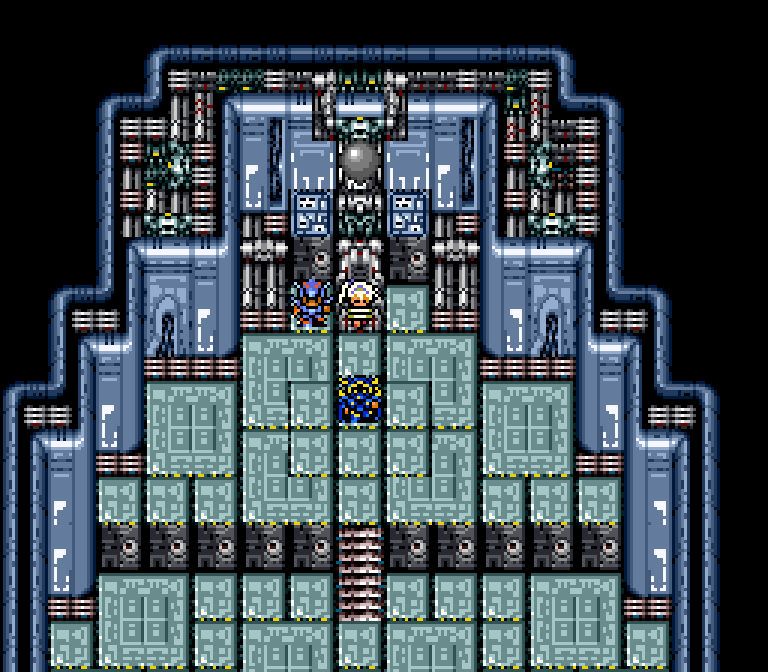 |
| Final Fantasy IV (Super Famicom) | Final Fantasy IV Easy Type (Super Famicom) | Final Fantasy II (Super NES) |
After the short scene at the base of Mt. Ordeals, the scene suddenly switches to an undisclosed location where Golbez and Kain are talking.
In the background, Rosa is tied up and sitting/standing in an unusual spot. It turns out there’s something dangerous hanging directly above her!
In Final Fantasy IV, this dangerous thing is a blade of some sort.
In Final Fantasy IV Easy Type and Final Fantasy II, it’s a big metal orb.
I’m assuming it was changed to be less violent (although that itself makes little sense), but I honestly think the change was very much for the better. You can actually tell that there’s something there in Easy Type / Final Fantasy II; in Final Fantasy IV I wouldn’t have even seen the blade thing had I not known it was supposed to be there.
For better reference, here’s what they look like side-by-side:
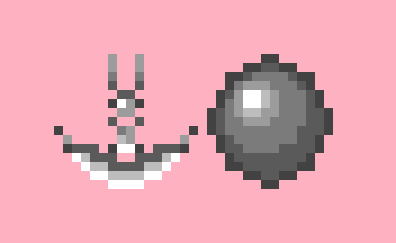
Also, we can see that the floor of the tower-type place this scene takes in has been simplified in Easy Type and Final Fantasy II – they no longer have those weird little grate things. I guess someone thought they didn’t seem like they could be walked on or something and got rid of them to simplify the layout.
Milon’s Crazy Castle
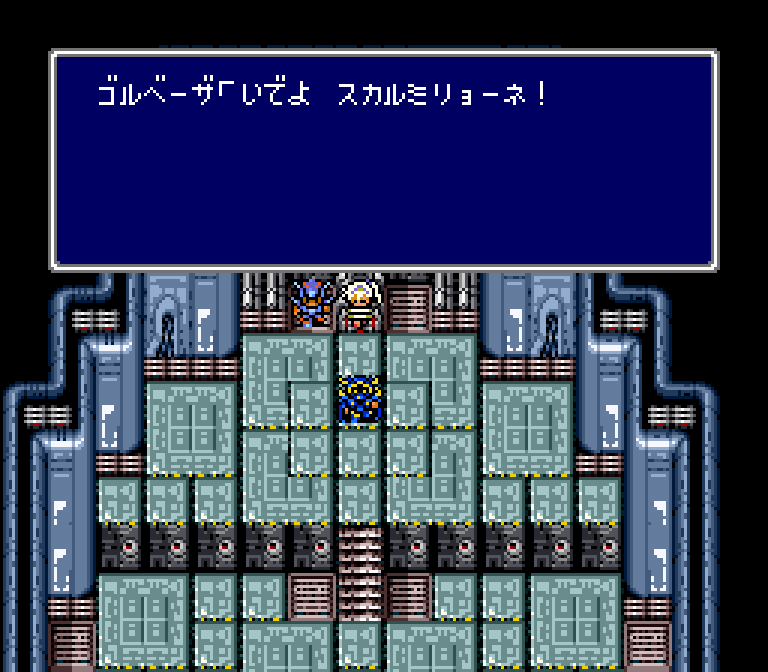 | 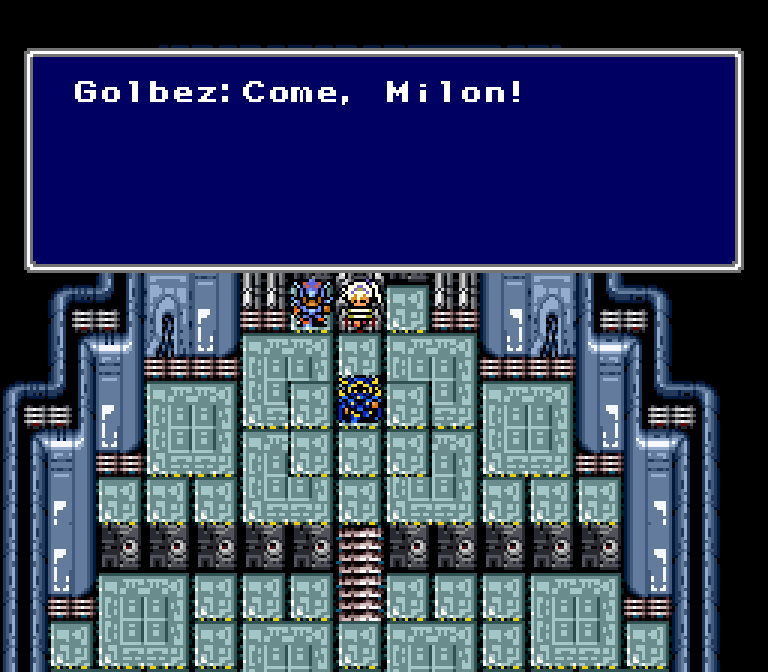 |
| Final Fantasy IV (Super Famicom) | Final Fantasy II (Super NES) |
Here’s what Golbez has to say to his minion during this scene:
| Final Fantasy IV (basic translation) | Final Fantasy IV Easy Type (basic translation) | Final Fantasy II (Super NES) |
| Golbeza: Come forth, Scarmiglione! | Golbeza: Come forth, Scarmiglione! | Golbez: Come, Milon! |
| Scarmiglione: Scarmiglione of Earth, at your service… | Scarmiglione: Scarmiglione of Earth, at your service… | Milon: Milon of Earth, at your service. |
| Golbeza: We cannot make light of this one named Cecil. It seems it would be best to make a move against him while we can. | Golbeza: We cannot make light of this one named Cecil. It seems it would be best to make a move against him while we can. | Golbez: We must not leave Cecil alive. We’d better make a move against him. |
| Fortunately, he is a Dark Knight. His sword will be dulled against the undeads you lead. | Fortunately, he is a Dark Knight. His sword will not work against the undeads you lead. | Fortunately, his Dark Sword is nothing to fear for your monsters. |
| However, he is climbing the Mountain of Ordeals. | However, he is climbing the Mountain of Ordeals. | However, he is climbing Mt. Ordeals now. |
| Scarmiglione: Then he seeks to be a Paladin…? | Scarmiglione: Then he seeks to be a Paladin…? | Milon: Then, he is to become a Paladin? |
| Golbeza: Your mission is to eliminate him before that happens. | Golbeza: Your mission is to eliminate him before that happens. | Golbez: Your mission is to dispose of him beforehand. |
| Scarmiglione: …Worry not. Please sit back and observe from here, Master Golbeza… | Scarmiglione: …Worry not. Please sit back and observe from here, Master Golbeza… | Milon: Yes, My master. |
| Golbeza: In that case, go forth! | Golbeza: In that case, go forth! | Golbez: Very well. |
| Scarmiglione: Yes… | Scarmiglione: Yes… |
The big, obvious difference here is that “Scarmiglione” was renamed to just “Milon” in the translation. This is understandable, since such long names aren’t possible in battle, plus such a long name would take up nearly a whole line on a standard text box anyway.
Incidentally, Scarmiglione’s name comes from Dante’s famous “Divine Comedy”. In particular, Scarmiglione is one of the Malebranche, which are demons in the Inferno in the story. Many other characters in Final Fantasy IV get their names from here too – we’ll look at them as they come up.
Besides the name change, a few other things are worth noting:
- Golbez goes from saying that they can’t underestimate Cecil in the original script to saying flat out that he needs to die in the English translation.
- There was a slight sentence simplification in Final Fantasy IV Easy Type centered around the word for “to be dull”, as in a blade having a dull edge. This was changed to simply say “won’t work” instead.
- Scarmiglione responds to Golbez’s orders with a few sentences filled with confidence. In the English localization this is gone. Instead he just says, “Yes, My Master.” and then leaves.
- Because of the above change, Scarmiglione’s last line is missing from the English translation. Given the context, I would probably have translated this as, “Yes, Master.” too.
Sucks to be Kain
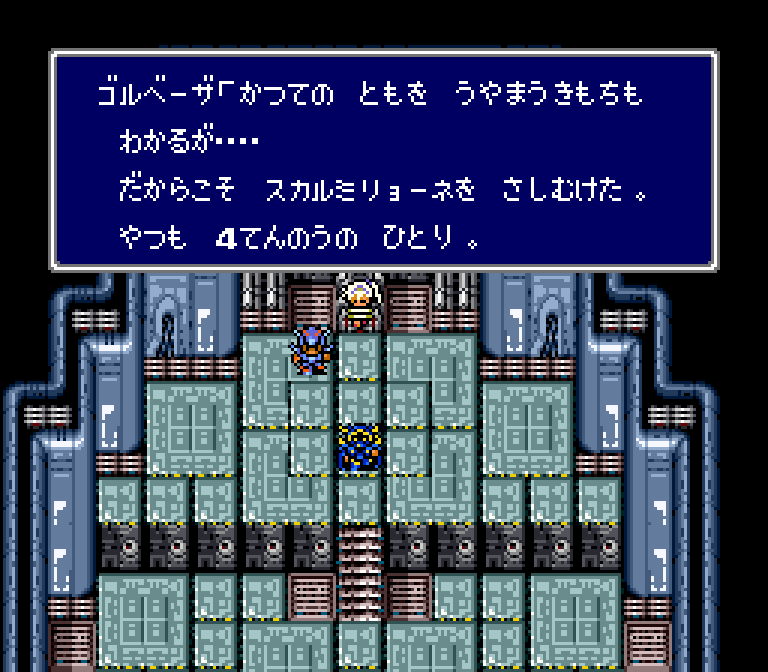 | 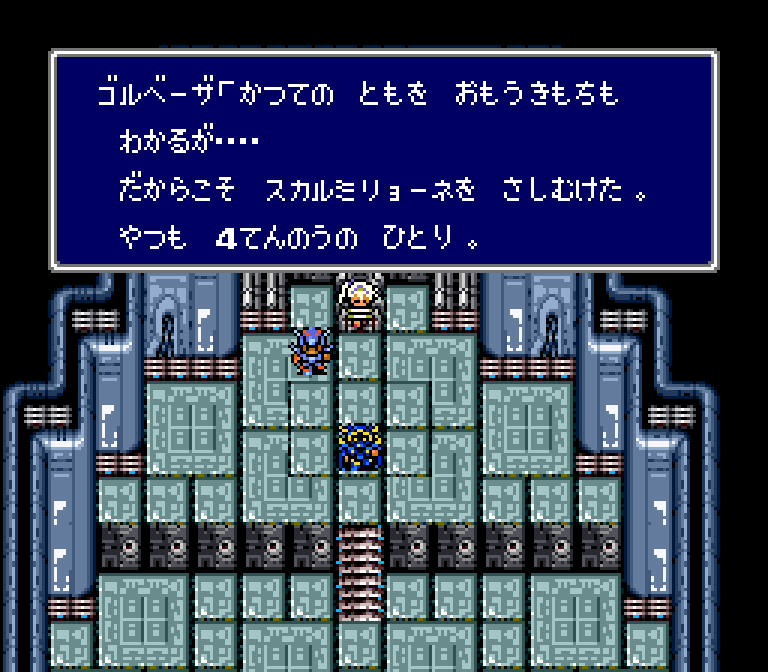 | 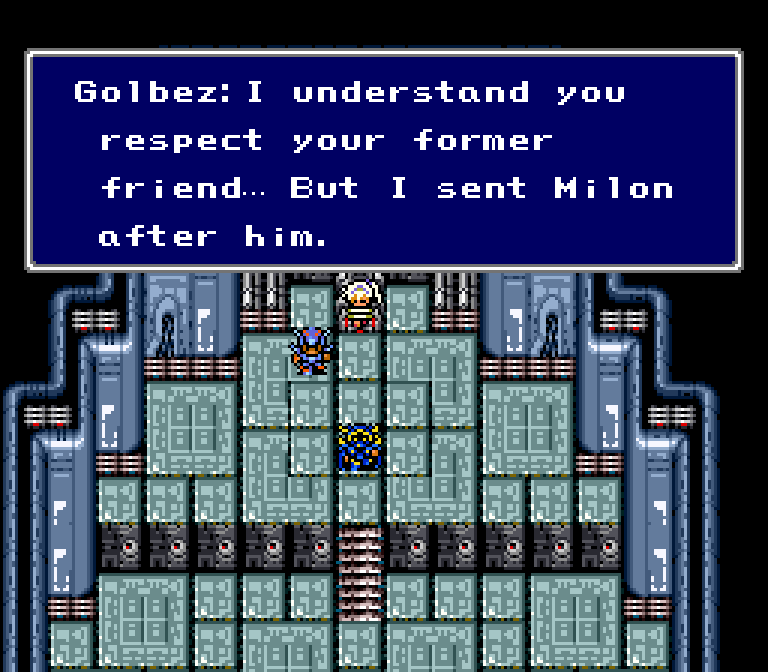 |
| Final Fantasy IV (Super Famicom) | Final Fantasy IV Easy Type (Super Famicom) | Final Fantasy II (Super NES) |
The scene in the tower continues:
| Final Fantasy IV (basic translation) | Final Fantasy IV Easy Type (basic translation) | Final Fantasy II (Super NES) |
| Golbeza: Things have certainly become interesting, haven’t they, Cain? | Golbeza: Things have certainly become interesting, haven’t they, Cain? | Golbez: Things have becoming interesting, don’t you think, Kain? |
| Cain: Yes, sir… But you mustn’t underestimate Cecil’s power… | Cain: Yes, sir… But you mustn’t underestimate Cecil’s power… | Kain: Yes. But Cecil might prove quite a formidable opponent. |
| Golbeza: I understand your feelings of respect for your former friend… | Golbeza: I understand your feelings for your former friend… | Golbez: I understand you respect your former friend… |
| But it is for that very reason that I sent Scarmiglione after him. | But it is for that very reason that I sent Scarmiglione after him. | But I sent Milon after him. |
| He is one of the Four Heavenly Kings. | He is one of the Four Heavenly Kings. | Milon is one of my Four Fiends of Elements. |
| He will surely give us enjoyment. | He will surely give us enjoyment. | He’ll put on a good show. |
| Isn’t that right, Rosa?! | Isn’t that right, Rosa?! | Don’t you think, Rosa? |
| Cain: Allow me to handle him! | Cain: Allow me to handle him! | Kain: Let me take the task of slaying him instead of Milon! |
| Golbeza: After that deplorable display you gave before?! You need only to keep an eye on Rosa! | Golbeza: After that pathetic show you gave before?! You need only to keep an eye on Rosa! | Golbez: How dare you ask for such a task! I’ve had enough of your blundering. You only have to watch this girl! |
| Cain: Yes, sir! | Cain: Yes, sir! | Kain: Yes, Master! |
| Rosa: Be careful, Cecil…! | Rosa: Be careful, Cecil…! | Rosa: Cecil, watch out…! |
This is a lengthy bit of text, so let’s pick it apart in list format:
- In the Japanese text, Golbez explains that he sent Scarmiglione after Cecil because Kain has too much respect for Cecil. This nuance was lost in the English translation, so Golbez just comes off as a, “We’re doing it this way just because I said so!” type of guy.
- In English, Milon is one of the “Four Fiends of Elements”. In Japanese, he’s one of the “Four Heavenly Kings”. This actually comes from Buddhism – you can read more about this term here. I remember wondering where this Japanese term came from, so now it makes much more sense to me!
Apparently this phrase is somewhat common in Japanese games for anything that has a powerful group of four people. For instance, there are characters in the Kunio games (River City Ransom in English) that use this Four Heavenly Kings title, and it’s also used in the Japanese version of Pokemon to refer to the Elite Four:
- In the English translation, Kain calls Golbez his “Master” again. As we saw back in Fabul, this is a plot piece that shouldn’t have been revealed yet, but for some reason the translation decided to give out this info much earlier than it should have.
- There are a few differences in the two Japanese scripts. Again, they were meant for simplification and are hard to convey well in translation, but I can see why some of these Japanese words might be considered too tough for young kids to understand.
- For some reason, there’s a double space in one of Kain’s lines in the English translation. It’s after a period, so maybe someone was still used to that weird “two spaces after a period” rule you learn in school.
In all, there isn’t much of a difference in the text here, but it’s nice to see what nuances were changed and/or lost in translation.
Boxes Everywhere
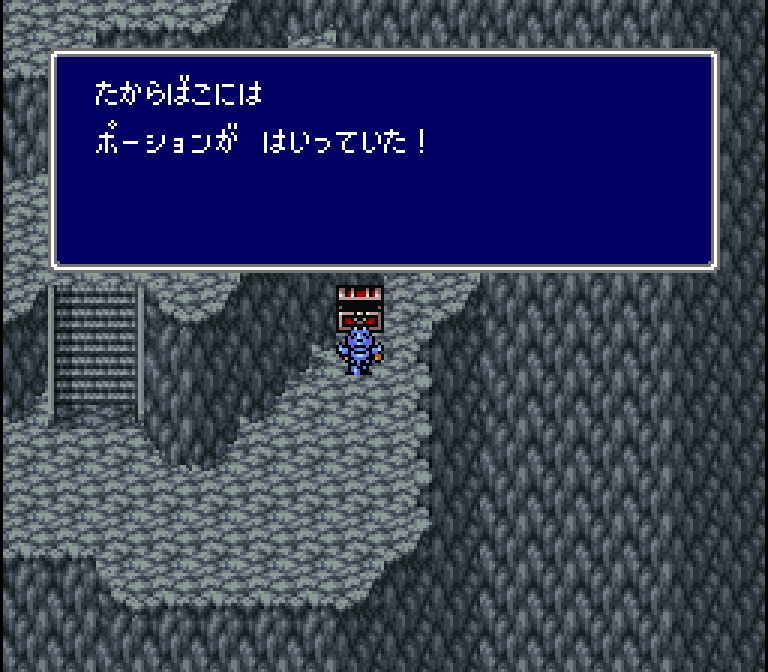 | 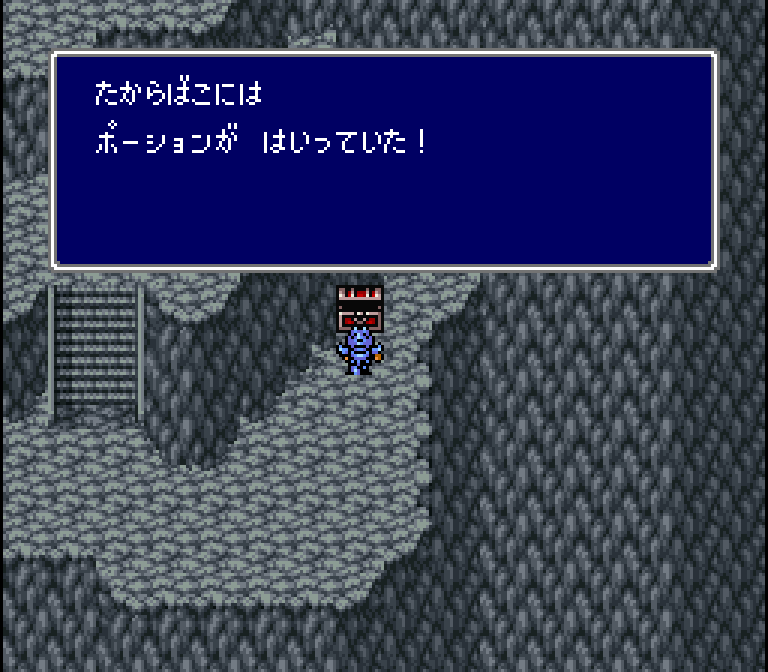 | 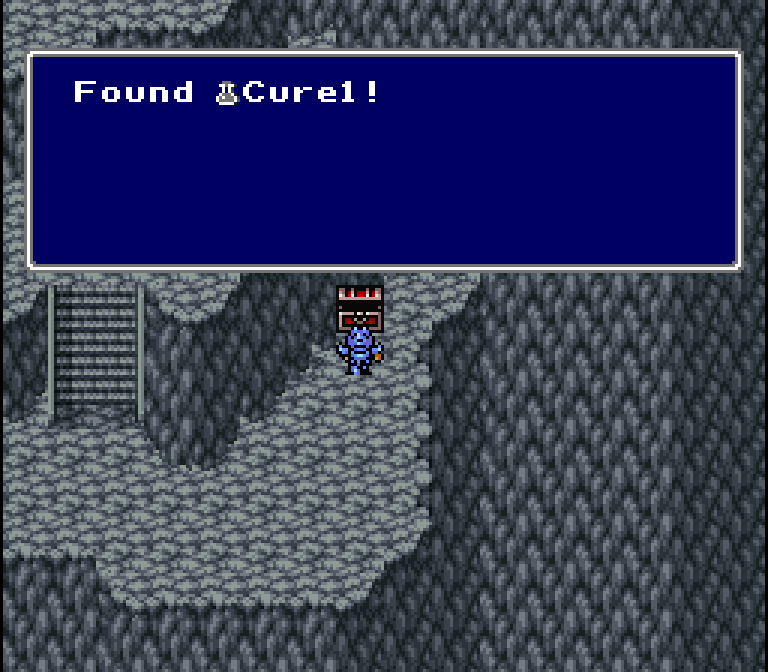 |
| Final Fantasy IV (Super Famicom) | Final Fantasy IV Easy Type (Super Famicom) | Final Fantasy II (Super NES) |
As we’ve seen previously, many of the treasure chests’ contents are different in the three versions of the game.
…Except this is apparently a rare occasion when none of the treasure chests were changed!
Station Frustration
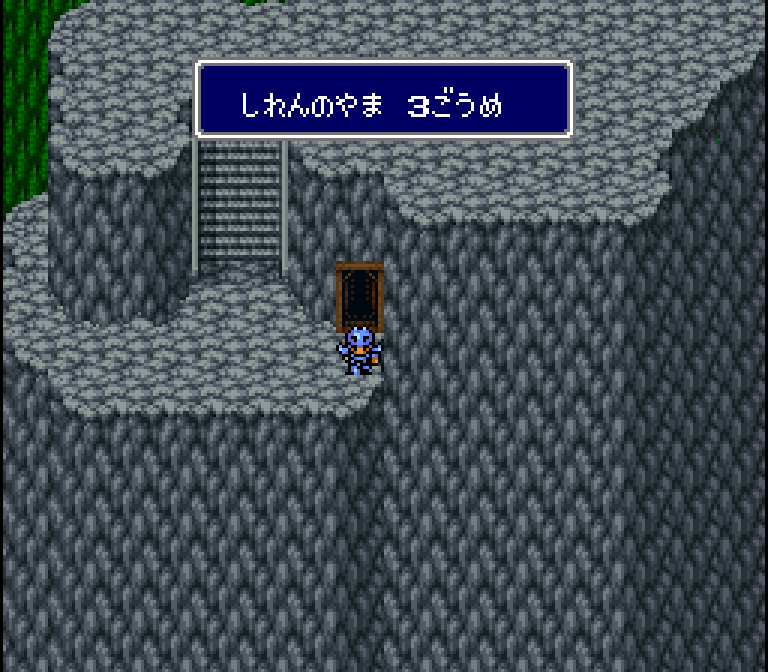 | 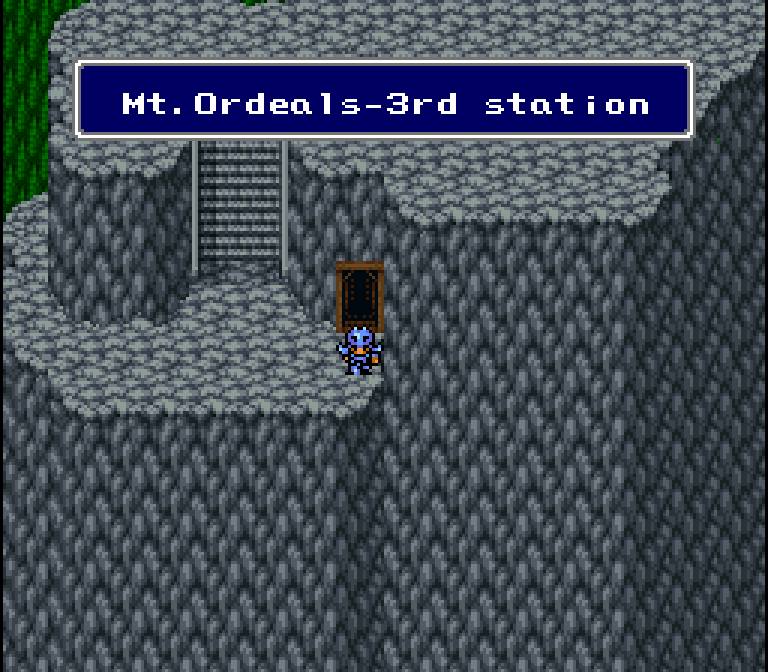 |
| Final Fantasy IV (Super Famicom) | Final Fantasy II (Super NES) |
As a kid, I often wondered why some of the places on Mt. Ordeals were called “stations”.
To this day, I’m not quite sure what it refers to – I’m guessing it’s sort of a designated spot on a mountain trail, or a marker showing how far up the mountain you are.
I only know the Japanese term because it’s used a lot when talking about trails up Mt. Fuji:
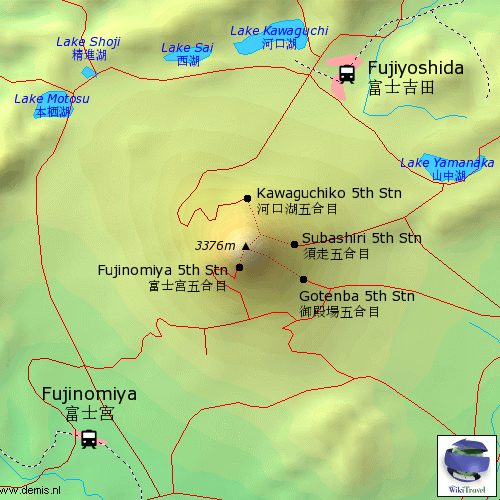
If anyone knows more about this stuff, please let me know!
Death Ain’t Nothin’ Much
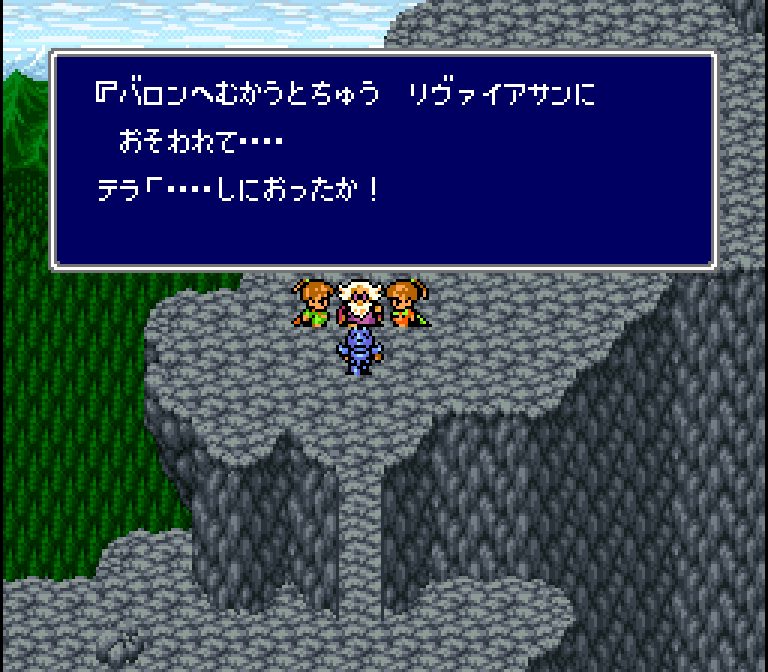 | 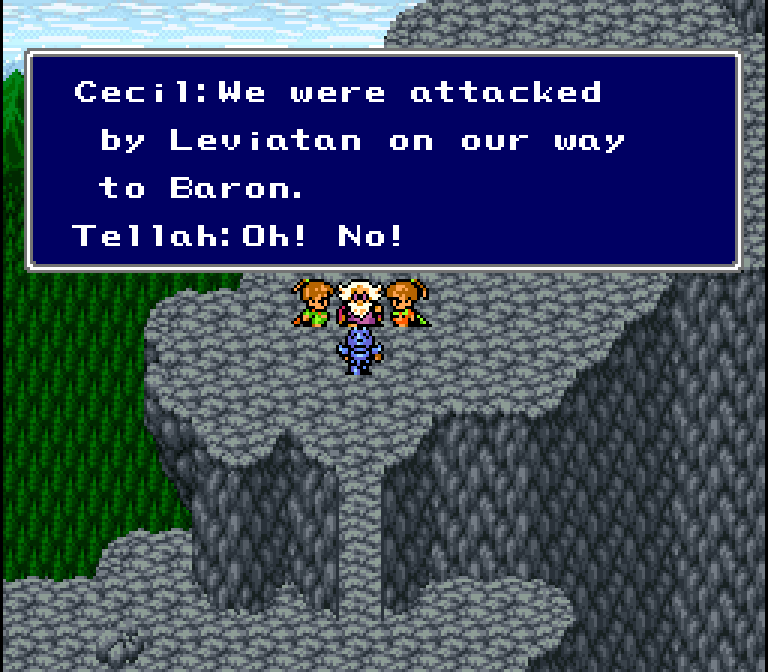 |
| Final Fantasy IV (Super Famicom) | Final Fantasy II (Super NES) |
While climbing up the mountain, Cecil and his companions bump into Tellah.
| Japanese Version (basic translation) | English Translation |
| Cecil: Tella! | Cecil: Tellah! |
| Tella: Cecil! | Tellah: Cecil! |
| Tella: So you seek Meteo as well…? | Tellah: You seek for Meteo as well? |
| Cecil: Meteo? | |
| Porom: If he knows about Meteo, that means… | Porom: He knows of Meteo. That means… |
| Palom: Old guy! Are you the Tella? | Palom: Hey, man! You are Tellah, right? |
| Porom: Call him Master Tella! How rude! | Porom: Watch your mouth! Call him Master Tellah! |
| Porom: It is an honor to meet you. We were ordered by the elder of Mysidia to… | Porom: We are honored to see you. We are ordered by our Elder to… |
| Palom: Keep an eye on… | Palom: spy on… |
| POW! | POW! |
| Porom: Eheheh! We’re guiding Mr. Cecil up the Mountain of Ordeals. My name is Porom. | Porom: Hem! We are to guide Cecil in Mt. Ordeals. My name is Porom. |
| Palom: And I’m Palom! | Palom: And I’m Palom. |
| Ah! So, old man, you’re the Tella who’s even famous in Mysidia! | So you are Tellah! You are famous in Mysidia too! |
| Tella: Children of Mysidia, huh? What became of Gilbert and Rydia? | Tellah: Kids of Mysidia. Very well. And… Edward and Rydia? |
| Cecil: We were attacked by Leviathan on our way to Baron and… | Cecil: We were attacked by Leviatan on our way to Baron. |
| Tella: …They died?! | Tellah: Oh! No! |
| Cecil: Yeah… | |
| And Rosa has fallen into Golbeza’s hands… | Cecil: And Rosa was captured by Golbez. |
| Palom: That must be his lover! | Palom: That must be his girl friend! |
| Porom: Shh! | Porom: HUSH! |
| Cecil: But I thought you were on your way to see Golbeza…? | |
| Tella: It would be impossible to defeat someone of his level with only the magic I currently have. | Tellah: I cannot defeat Golbez with my spells alone. |
| I was searching for Meteo, the legendary magic spell that was sealed away, and sensed powerful spiritual energy on this mountain! | I’ve been seeking the magic of legend, Meteo. I felt a strong power from this mountain. |
| Perhaps Meteo is here… | |
| Porom: That spell is dangerous! And you’re too long in years, Master Tella… | Porom: Meteo is too dangerous! You are too old… Oops… |
| Tella: Indeed, I am old and decrepit! However, even if it costs me my life, I must defeat him… Golbeza! | Tellah: Yes, I’m old. But no matter the price, I must avenge my daughter! |
| Cecil: … | |
| Palom: Ugh. Grownups can be such a pain in the neck. | Palom: Grown-ups! They like troubles! |
| Porom: Be quiet, child! | Porom: Be quiet! It’s no place for kids. |
| Tella: Why did you come here, Cecil? | Tellah: Why did you come here, Cecil? |
| Cecil: I’m here to become a Paladin. | Cecil: I came here to be a Paladin. |
| It sounds like I can’t defeat Golbeza with the Dark Sword… | My Dark Sword cannot defeat Golbez… |
| So I want to part ways with this detestable Dark Sword…! | |
| Palom: I wonder who Golbeza is… | Palom: Who is Golbez? |
| Porom: You don’t know anything, do you?! He’s the guy controlling Baron! | Porom: You don’t know!? He’s controlling Baron! |
| Tella: Yes, he is the root of all evil! | Tellah: Yes, he is the source of all evil! |
| Tella: Still… A Paladin, huh… | Tellah: Paladin… |
| Just as I suspected, something is hidden on this mountain! | There must be some secret hidden in this mountain. |
| Perhaps I will accompany you. | I will come with you! |
| …I’m coming for you, Golbeza! |
Whew! There are so many little nuance differences here that I won’t cover them all – I’ll save that as an exercise for the reader instead. But here are some of the more interesting points:
- Although the translation is good, the English writing still suffers from many issues, including awkward, non-native phrasing, punctuation issues, spelling mistakes, and capitalization issues.
- A lot of the English text was shortened, and in some cases some entire lines were left out.
- The lack of some lines results in sudden topic jumps in the English translation, which are a bit odd.
- One of Tellah’s lines has “Very well.” added to it for no real reason.
- Porom says “oops” in the English text after saying Tellah is old, but this isn’t in the Japanese text. In fact, Porom speaks in a very polite and respectful way toward Tellah the entire time in Japanese.
- Tellah specifically says he’s willing to give up his life in the Japanese text, but this is made vaguer in the English text. I don’t know if this was done for censorship purposes or if it was just a product of the translator’s style.
- The Japanese text says that the Meteo spell was sealed away. This isn’t in the English text. Knowing that it’s a spell that’s been sealed away suddenly adds a lot more mystique to it and a sense of danger. It’s a shame I never knew this tidbit as a kid, it would’ve been cool.
Apparently some supplementary materials released much later on (including the After Years sequel) go into more detail about Meteo and why it was sealed away to begin with.
- There’s a line in Japanese that shows that Cecil desperately wants to give up being a Dark Knight, but the English text leaves this line out. It’s strange that they’d leave that out, since it’s a key part of his character development. By comparison, in the English version his character development at this point is almost like, “Welp, can’t beat Golbez with this Dark Sword, guess I’ll just mozy over to that mountain and fix that.”
- Tellah’s final yell has been taken out of the English text.
- In Easy Type, the Japanese line about Golbez being the root of all evil was simplified to say, “Yes… It’s all his fault!”
That’s all fine and good and in a way not that huge of a deal, but the real topic of discussion here is how Cecil tells Tellah about Edward and Rydia.
For easy reference, here’s another look at this particular part:
| Japanese Version (basic translation) | English Translation |
| Tella: Children of Mysidia, huh? What became of Gilbert and Rydia? | Tellah: Kids of Mysidia. Very well. And… Edward and Rydia? |
| Cecil: We were attacked by Leviathan on our way to Baron and… | Cecil: We were attacked by Leviatan on our way to Baron. |
| Tella: …They died?! | Tellah: Oh! No! |
| Cecil: Yeah… |
As you can see, Tellah comes to the conclusion that Edward and Rydia died in the Leviathan attack. To this, Cecil responds simply with, “Yeah…”
Cecil’s response has such a casual, “whatever” feel to it that this line is somewhat infamous among Japanese fans. To the point that later versions of the game have supposedly gone and revised Cecil’s response in different ways. I haven’t played any of the Japanese ports or remakes, so I can’t confirm this, but I wouldn’t be surprised.
Of course, the English localization gets around this entire thing by writing out the part about death and dropping Cecil’s line from the script entirely.
Meet Milon
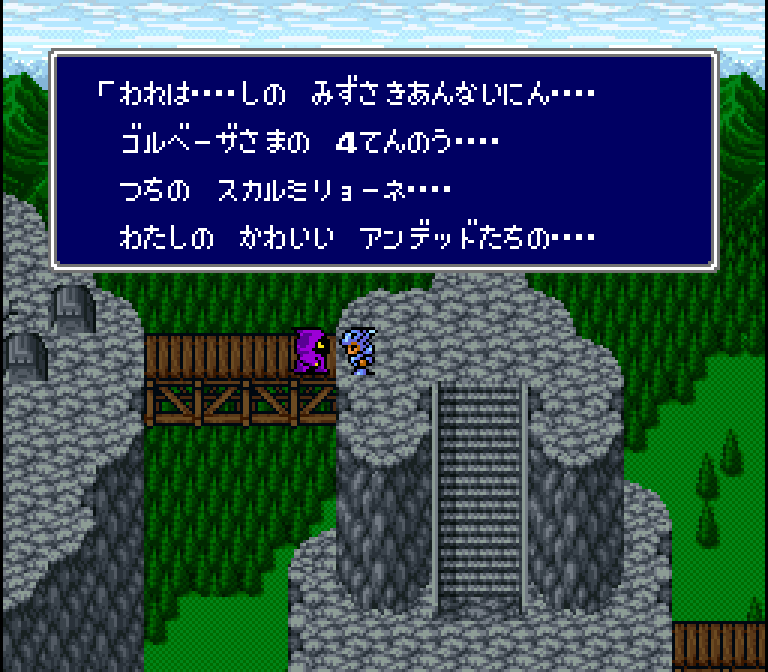 | 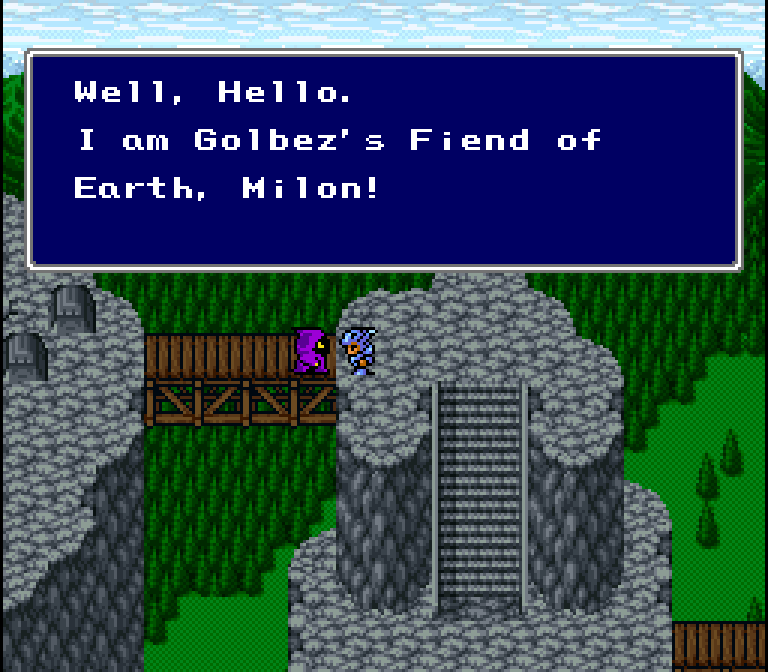 |
| Final Fantasy IV (Super Famicom) | Final Fantasy II (Super NES) |
The English translation from Milon to the Paladin class change is a little better than usual. Still, there’s something of note when you first meet Milon on the bridge.
After the standard, “Who are you?!” and all that stuff, Milon says this:
| Japanese Version (basic translation) | English Translation |
| I am… the ferryman of death… One of Master Golbeza’s Four Heavenly Kings… Scarmiglione of Earth… | Well, Hello. I am Golbez’s Fiend of Earth, Milon! |
His line actually sounds pretty cool in Japanese, even if it doesn’t come across that way literally.
I always thought the capitalized “Hello” was odd in the English translation. I didn’t realize it didn’t even belong there at all!
I should also point out that in Japanese, Scarmiglione speaks in a semi-archaic style that’s often used for wise and powerful characters in Japanese entertainment.
Do You Want My Body
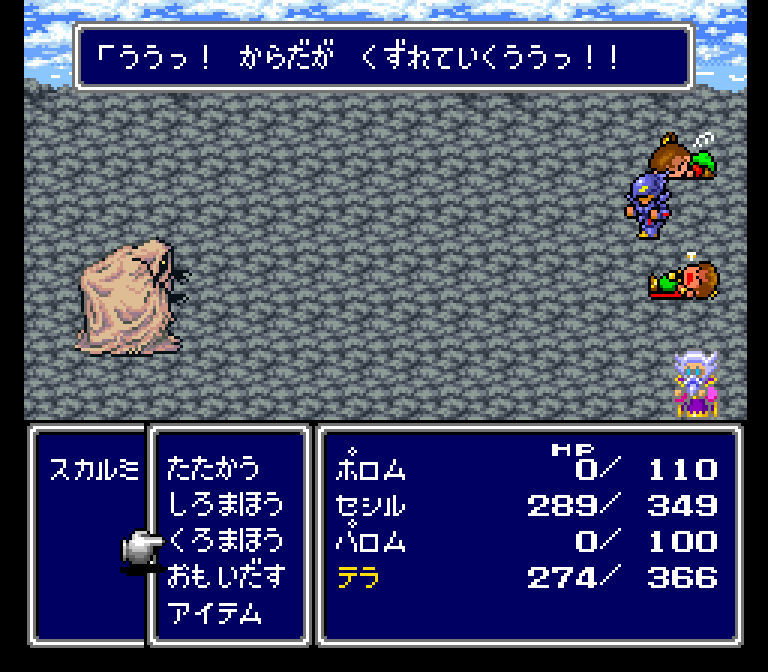 | 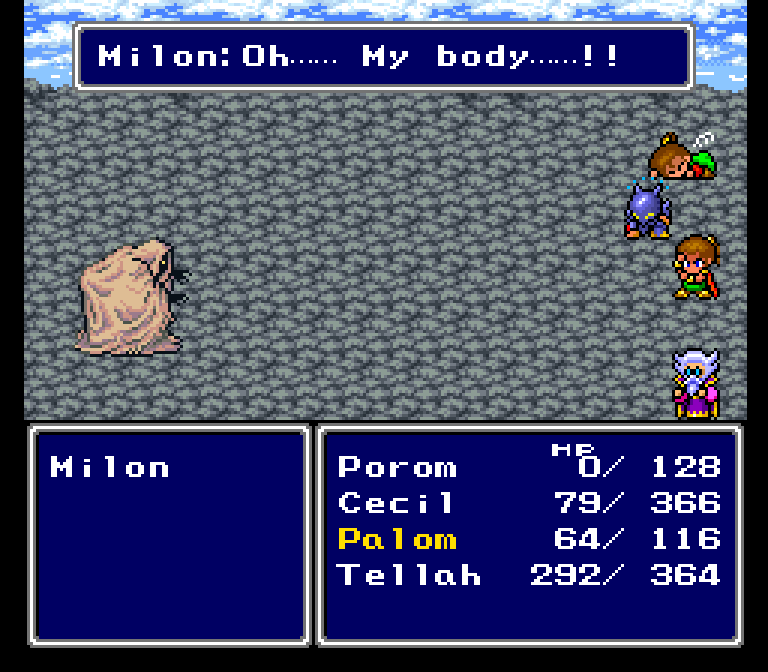 |
| Final Fantasy IV (Super Famicom) | Final Fantasy II (Super NES) |
Once you defeat Milon in battle, he says in English, “Oh…… My body……!!”
In Japanese, he says something more like, “Uuu! My body’s falling apaaart!!”
Beyond the Bridge
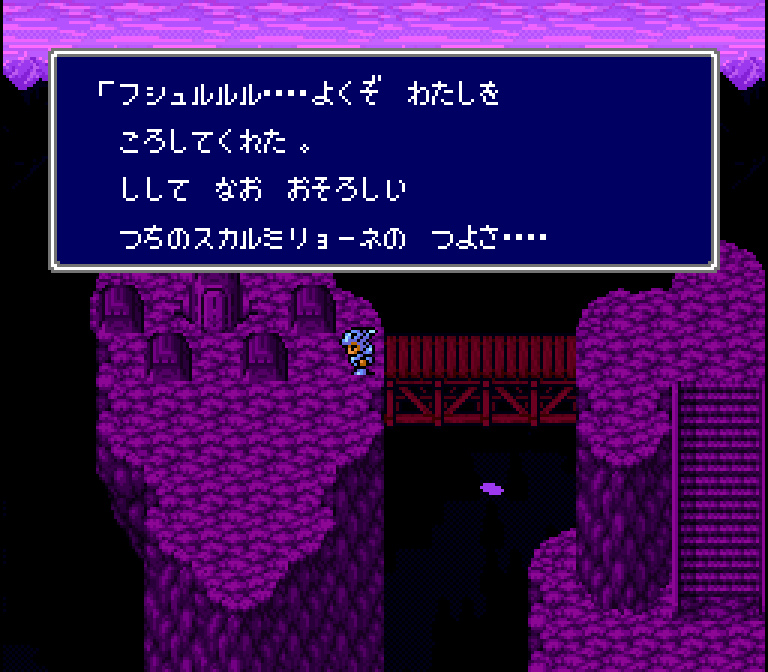 | 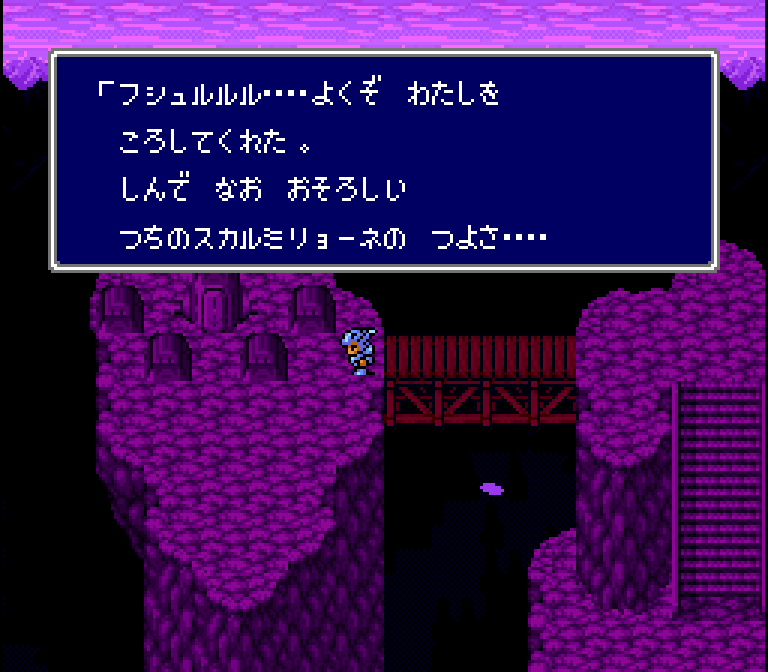 | 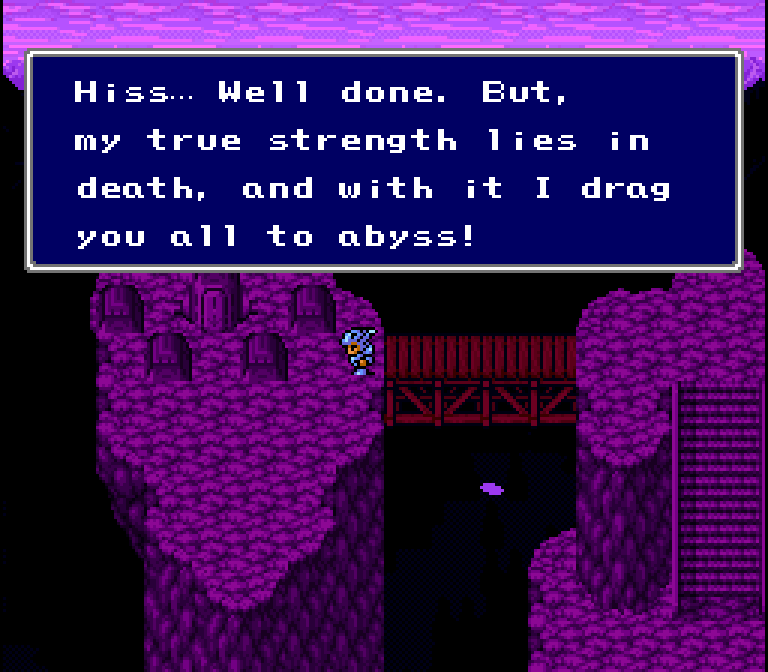 |
| Final Fantasy IV (Super Famicom) | Final Fantasy IV Easy Type (Super Famicom) | Final Fantasy II (Super NES) |
Once you’ve defeated Milon, you can cross the bridge. But as soon as you get to the other side, he starts talking again!
| Japanese Version (basic translation) | English Translation |
| Thank you for killing me. In death, the power of Scarmiglione of Earth is even more terrifying… Die as you slowly savor it! | Well done. But, my true strength lies in death, and with it I drag you all to abyss! |
The English translation skips over “killing” but keeps in references of “death” for some reason. The English line “I drag you all to abyss” is very awkward and not what he says in the original text anyway.
Also, the Easy Type script has simplified his text a tiny bit by making the phrasing a little less archaic-sounding and a little more standard.
Flat Footed Fall
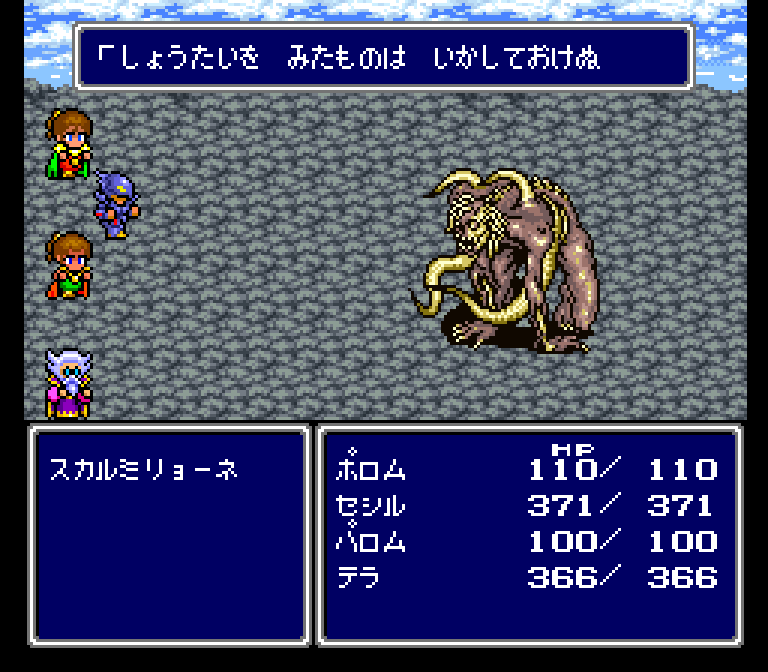 | 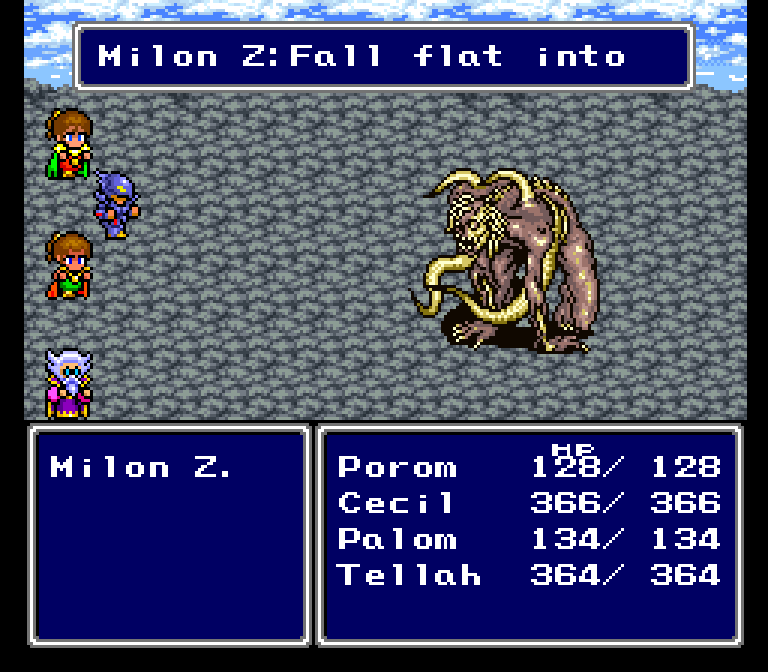 |
| Final Fantasy IV (Super Famicom) | Final Fantasy II (Super NES) |
The second battle with Milon now begins!
In the Japanese versions, he’s still called “Scarmiglione”, but for some reason in English his name is now “Milon Z.”
I never really thought about what this name meant – I think as a kid I just assumed the “Z” meant he was powered up, sort of like the “Z” in Dragon Ball Z, you know?
It never struck me until now that maybe it stands for “Zombie”, which is an understandable name I guess. Still, the “Z” is wholly unnecessary and just makes it a bit more confusing than anything.
Anyway, as soon as the battle begins, he starts talking to you:
| Japanese Version (basic translation) | English Translation |
| I cannot let those who’ve seen my true form live. | Milon Z: Fall flat into |
| I’m going to knock you off the cliff! | the deep ravine! |
I can’t even begin to guess how the English line turned out so badly. If there was a space issue, they could’ve just left out Milon’s name – the Japanese line doesn’t include it, after all.
A Gassy Fiend

There are a few instances where enemy behaviors were changed during the jump to Final Fantasy II and/or Final Fantasy IV Easy Type. The first big change is in this battle with Milon.
In Final Fantasy IV, if anyone in your party uses any sort of fire magic attack on Scarmiglione, he’ll respond by saying, “Breathe this gas and become living corpses!” He then uses a gas attack on the entire party that essentially has a “Curse Song” effect, at least according to these technical docs I’m looking at.
This counterattack was removed entirely from Final Fantasy IV Easy Type and Final Fantasy II, so I was surprised when I first encountered it in Final Fantasy IV.
Thus far many of the changes in Final Fantasy IV Easy Type and Final Fantasy II never really seemed to make the game significantly easier, but this is one of the few instances where things have clearly been made easier for players.
Down for the Count
 | 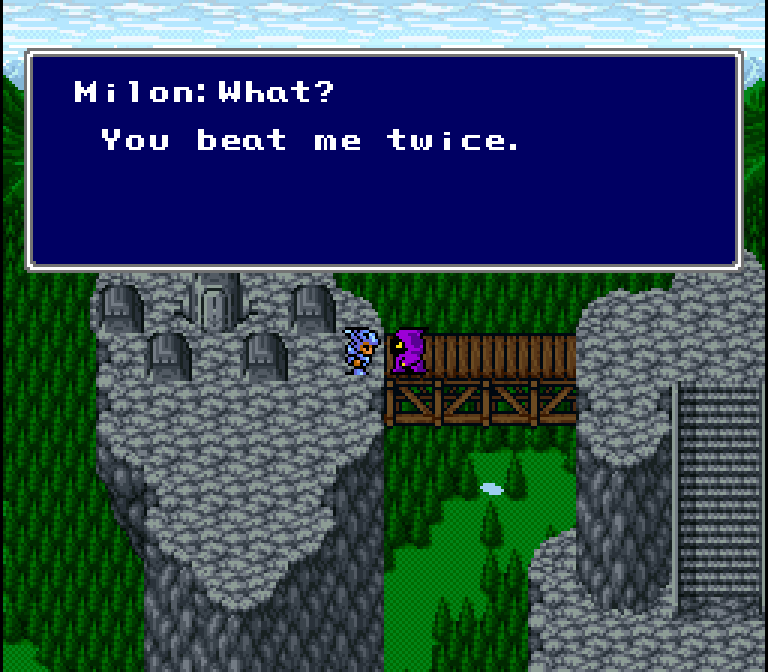 |
| Final Fantasy IV (Super Famicom) | Final Fantasy II (Super NES) |
Once you’ve finally defeated Milon, he has one final thing to say:
| Japanese Version (basic translation) | English Translation |
| Scarmiglione: Curse you… How could I be defeated by the likes of you…?! | Milon: What? You beat me twice. |
| Scarmiglione: Gu…paa! | Milon: GRRRR-BAAAH! |
Wow, quite another difference there.
That last part is the sound he makes just as he falls off the bridge, in case it isn’t clear.
 |
| Final Fantasy IV J2E Fan Translation |
Since he uses the word “kisama” here in Japanese, I decided to check out what the J2E fan translation gave for his line here, given the way the fan translators handled another instance of “kisama” back in Damcyan. Here’s what it is:
Scarmiglione: You defeated me…twice!
The darkness…I’m falling…into eternal darkness…
Gr…Argh!
Now that’s worthy of a “wow”. The J2E fan translation of Final Fantasy IV was supposed to be the most definitive and accurate translation of the game possible, but here we see that:
- The first line isn’t from the Japanese script
- The first line was instead ripped straight from the supposedly inferior official Final Fantasy II SNES translation
- The second line is completely, 100% made-up
I’m almost tempted just to do a playthrough of this patch, it seems to go very much against what its goal was.
For reference, here are a bunch of other screenshots from the fan translation at around this same part of the game. Don’t mind the weird-looking names, they’re messed up because I used a Japanese save file to jump straight to this part in the fan translation:
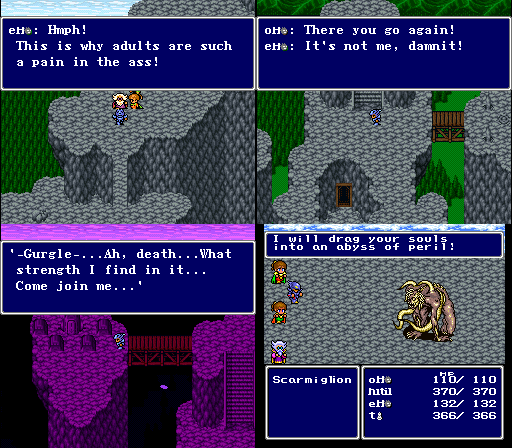
Each one of these has issues of its own – whether it’s incorrect translation, improper use of swearing, or just making stuff up out of nowhere. In fact, I’d say this script veers way more off course than the official translation.
Here’s what the patch’s documentation says:
Why would we re-translate a game already translated here in North America? Simple… Square Soft did a HORRIBLE job translating this game! They used bad english, tons of abbreviations, and censored out many important parts of the story that were in the japanese scripts! Also FF2us was based on FF4j Easytype, which was alot easier than the hardtype version which is what we translated. Also in the Easytype version many things (like items and stuff) were censored out, but with this translation you get everything that was origianally meant to be in FF4! including the ever famous Porno Mag! hehehe
I think the quality of that block of writing speaks volumes about the quality of the patch.
It’s strange, because I was involved with J2E on some projects back then and had fun working with them, but I’m more and more amazed at how poor the final product of this particular project turned out. Maybe it was just a case of youthful excitement and fan enthusiasm getting out of control, which is a common risk in fan translations of any sort.
Anyway, I’m hoping someone will do a real fan translation of Final Fantasy IV someday, with proper translations and better presentation.
I’m Your Father
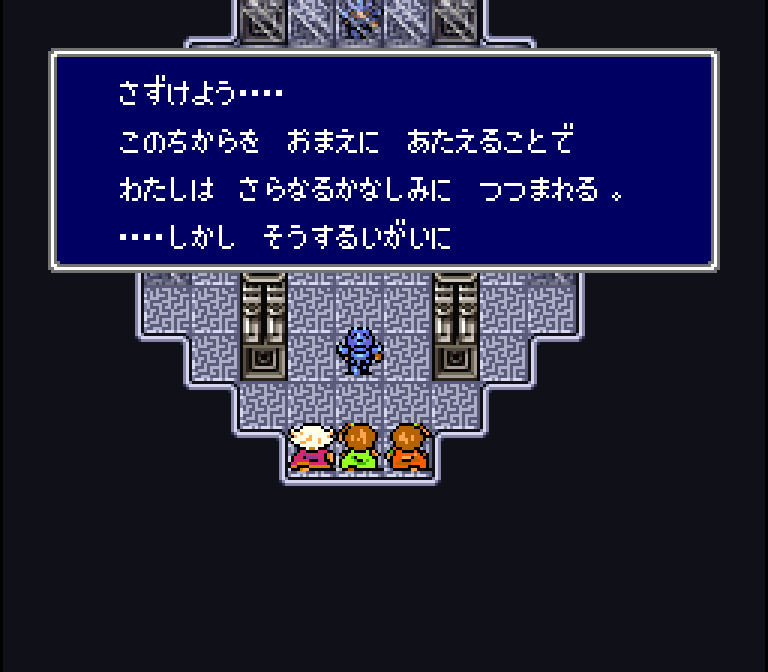 | 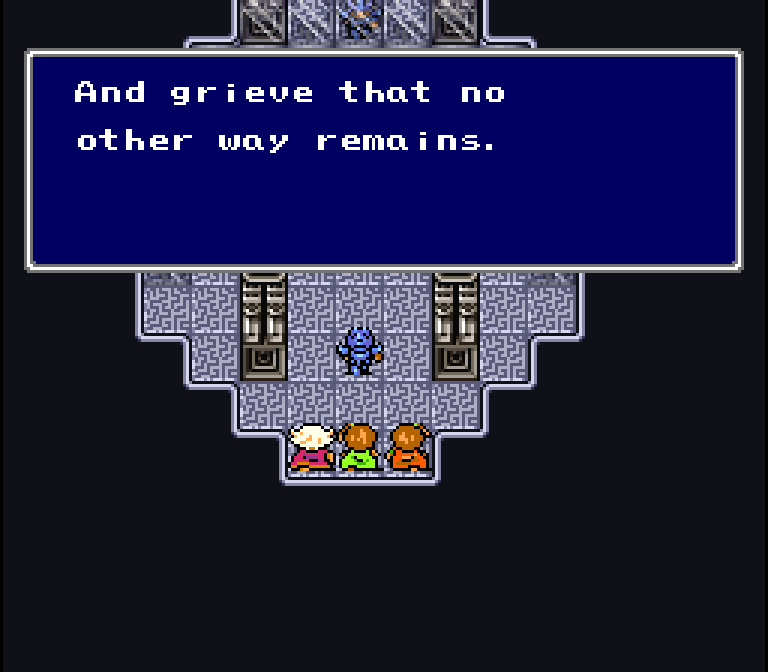 |
| Final Fantasy IV (Super Famicom) | Final Fantasy II (Super NES) |
Once Milon is defeated, you can visit a weird shrine-type place. At the entrance, a voice speaks out and calls Cecil his son. This text is decently translated, so we’ll skip it.
Next, Cecil and his party enters the mirror-filled shrine. A bit of important text occurs here, so let’s take a look!
| Japanese Version (basic translation) | English Translation |
| I was waiting for you to come… | I’ve been waiting. |
| Right now… something that is sad to me is happening. | Sorrow fills me. |
| I will now give you my power… | I shall entrust you with my power. |
| By granting you this power, I will be enveloped in even greater sadness. | |
| …However, no other way remains. | And grieve that no other way remains. |
This English text always sounded a bit odd to me when I was a kid. I couldn’t tell if it was fancy English writing or another poorly-written Japanese translation.
It turns out that it’s not too far off from the original text, but the original text is a little clearer about things.
The big thing is that some nuanced details have been left out – in the English text, he says that he’s filled with sorrow, but not why. Apparently some sort of current state of affairs is making him sad, and helping Cecil will cause him to become even sadder. This is one of the only glimpses we get of Cecil’s father’s character – which is a pretty big deal given that Cecil grew up as an orphan. Oh wait, that was left out of the English translation too. Oh, man.
Anyway, the scene continues:
| Japanese Version (basic translation) | English Translation |
| Now, part with your blood-soaked past. | Part from your past! |
| The sacred power will not accept you if you cannot conquer who you have been until now. | Conquer your Darkness within! |
| Defeat him… Your own Dark Knight self! | If you can’t overcome your past self, the sacred power of Light will not accept you! |
It’s interesting how those two lines got switched around in the translation. Also, it’s hard to say for sure, but it seems like so far the text in this entire scene has been competently translated and received some level of polish.
The Easy Type script has a small change here:
Now, throw off your blood-soaked past.
The sacred power will not accept you if you cannot overcome who you have been until now.
From this, it looks like the official English translation is closer to the Easy Type script than the original script.
The scene continues! A Dark Knight appears and approaches Cecil!
| Japanese Version (basic translation) | English Translation |
| Tella: Two Cecils? | Tellah: Two Cecils? |
| Palom: What’s goin’ on here!? | Palom: What’s going on? |
| Porom: Mr. Cecil! | Porom: Cecil! |
| Tella: Cecil! | Tellah: Cecil! |
| Palom: Dude! | Palom: Hey! Dude! |
| Porom: Look out! | Porom: Watch out! |
| Cecil: Stay out of this! | Cecil: No need to help. |
| This is a fight with myself! | This is my own fight! |
| To atone for all my past mistakes, I must defeat him – the Dark Knight! | I must defeat him to amend my past guilt! |
There are a few differences to point out here:
- Earlier, I pointed out that Palom uses the word “anchan” to refer to Cecil, and that I personally would’ve translated it as something like “dude”. Well, here it is now, suddenly translated as “dude”! I find it hard to imagine a native Japanese speaker would know to use “dude” like this (or at least the translators for this game), so this lends a little more evidence that a native English speaker (possibly even a translator who’s a native English speaker) probably gave this particular cut scene a look-through.
- In this context, there’s a nuance difference between, “This is a fight with myself!” and, “This is my own fight!” In the end, it doesn’t make much of a difference, but it was one of the first things I picked up on when I first played Final Fantasy IV many years ago.
Them’s Fightin’ Words
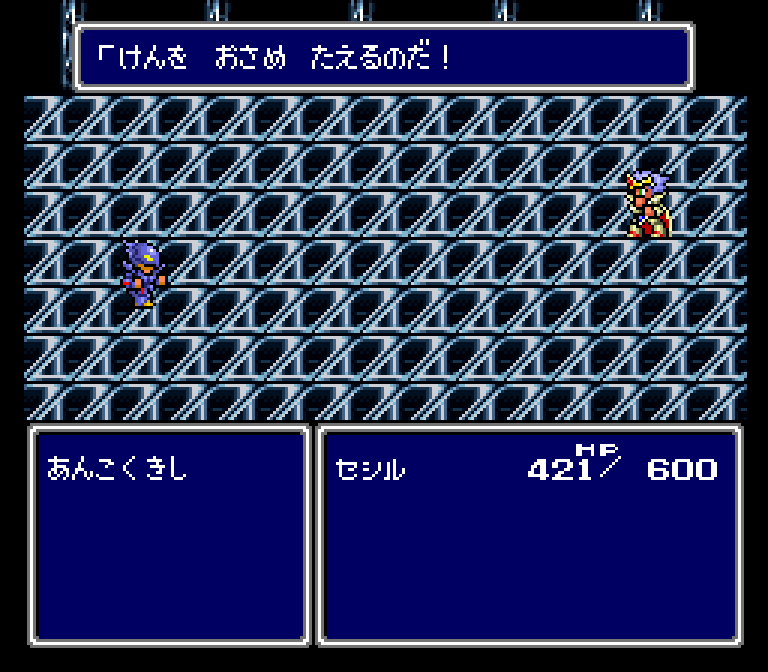 | 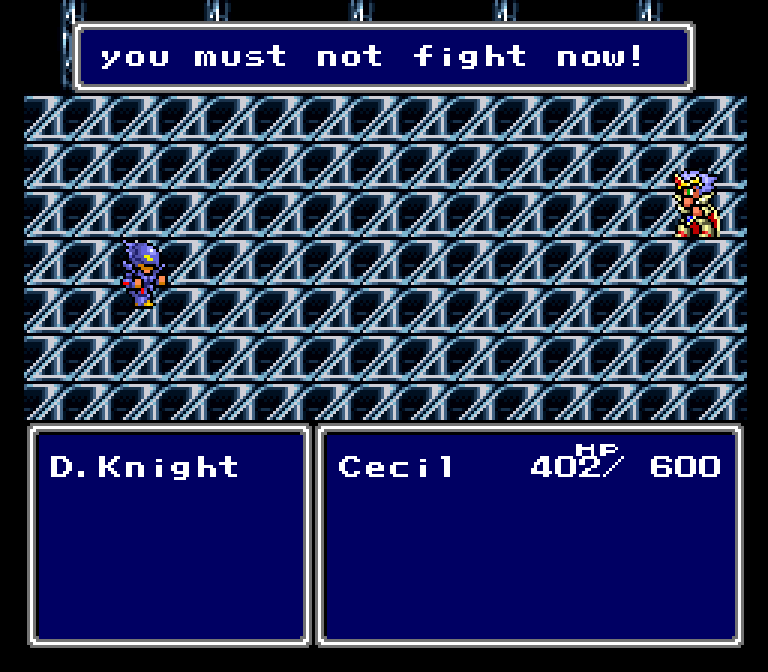 |
| Final Fantasy IV (Super Famicom) | Final Fantasy II (Super NES) |
Now a Paladin, Cecil must battle his Dark Knight self!
During the battle, if you choose to fight the Dark Knight, a text box appears and says this:
| Japanese Version (basic translation) | English Translation |
| If you are a real Paladin, then put your sword away and endure it! | To be a real Paladin, you must not fight now! |
It’s just a small difference, but I feel the Japanese text gives a better idea of what a Paladin is supposed to be. In contrast, the English translation kind of sounds like something out of an instruction manual, explaining the mechanics of how to get past this fight.
 | 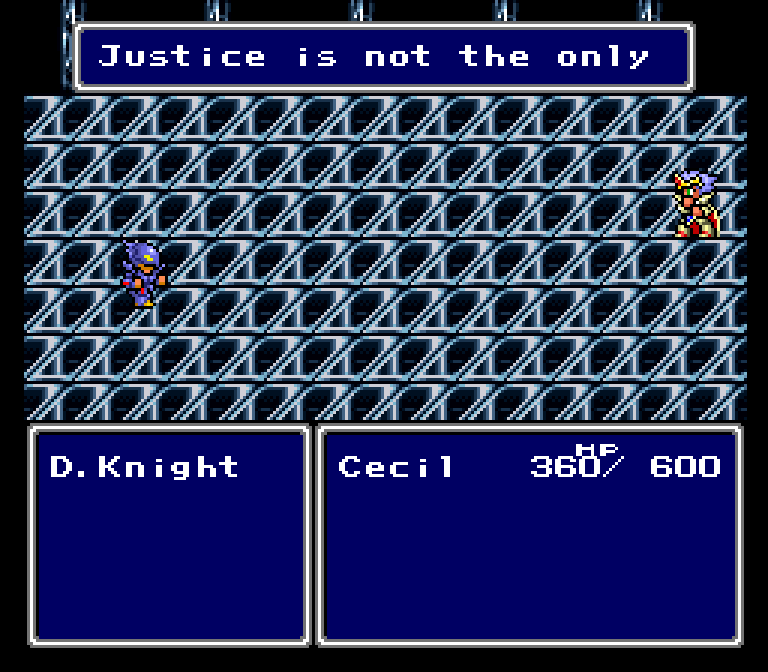 |
| Final Fantasy IV (Super Famicom) | Final Fantasy II (Super NES) |
Once the fight is about to end, the unnamed speaker continues by saying:
| Japanese Version (basic translation) | English Translation |
| There is something even more important than justice and righteousness. | Justice is not the only right in this world. |
| Someday, the time will come when you understand this. | Some day, you will see. |
| Go! Cecil! | Go… Cecil… |
I was never quite sure what this was referring to, but luckily an astute reader helped out by offering this:
You said in your analysis of translation differences of FFIV that there were some words on Mt Ordeals you didn’t quite understand as to what their significance in the overall plot was.
Namely, “Justice is not the only right in this world. Some day, you will see.”
I don’t think it’s ever been commented on by the developers, but I think this is the beginning of an ongoing, important theme of forgiveness vs hatred in the game. There are several times in the game where Cecil chooses mercy, in contrast to his antagonist Zemus (who of course has literally become hate embodied).
By not attacking his past self, Cecil is essentially expressing self-forgiveness. I think this is a pretty insightful bit of writing, because to forgive anyone else one has to be able to forgive himself.
He forgives Kain for his weakness and transgressions multiple times. And in the end, he forgives his brother Golbez.
Cecil, Kain, and Golbez are all examples where if “justice” were “the only right in this world”, the “rightest” response would be death to them all. But things turn out differently because the game’s idea of rightness is a just a little more sophisticated than most videogames.
Anyway, that’s my two cents.
That definitely makes sense to me now – I’d never considered the self-forgiveness aspect of it.
Anyway, as usual, the English text is much shorter because the battle text window is so limited in space.
I actually remember liking this English line back when I was a kid, but in a way I never quite understood it – I think I took the word “right” to have the “thing you’re allowed to do” definition, like the right to free speech. Except in this case, more like, “you have the right to have justice”.
It didn’t dawn on me that it was instead intended to have the “something that is proper and righteous” definition.
I gotta say that I really like the official translation’s choice of “Some day, you will see.” here. Good job, whoever did that! (Even if it should probably be “Someday” instead.)
Someone pointed out that there’s actually an interesting idea to this battle, one I never considered before because Final Fantasy II had removed Cecil’s special Dark Knight battle command:
This is more of a conveyance-through-game-design thing than a localization thing, but I think it’s pretty interesting, and it is a difference by version. Also, I can’t take credit for noticing this; that goes to some anonymous contributor to TV Tropes. Anyway, it’s subtle, but the fact that the Darkness ability drains its user’s HP might provide a hint about fighting the Dark Knight enemy on Mt. Ordeals. You’re told not to attack it, but what are you supposed to do? Well, the only thing it does is use the Darkness ability (in all versions, no less, I believe), so players who have used that themselves will know that it’s killing itself by doing so. It doesn’t actually work quite that way in terms of game mechanics, but it’s an interesting thematic tidbit, no?
Into the Light
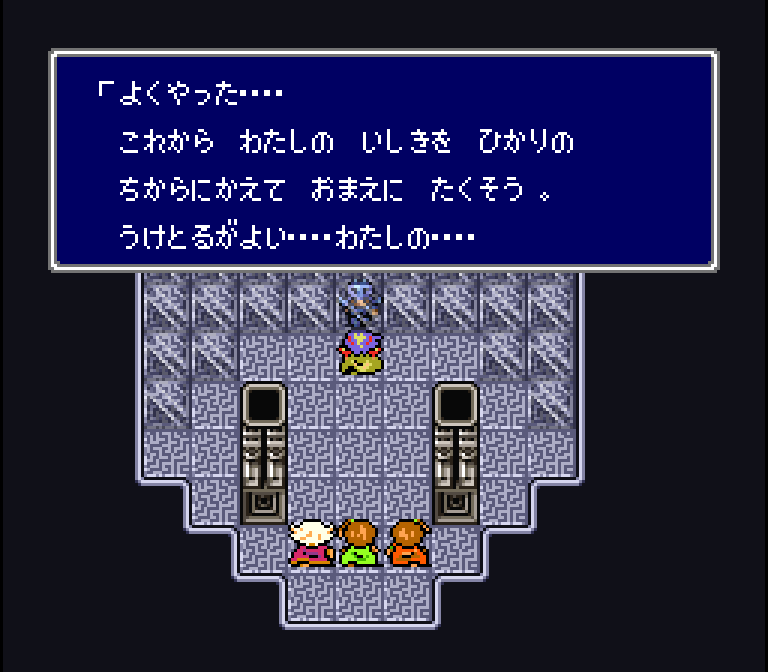 |  |
| Final Fantasy IV (Super Famicom) | Final Fantasy II (Super NES) |
After the Dark Knight is defeated, the rest of the scene plays out:
| Japanese Version (basic translation) | English Translation |
| Well done… | Well done. |
| I shall now change my consciousness into the power of light and entrust it to you. | Now I put my spirit into the power of Light and trust it to your hands. |
| Accept it… The last… of my light! | Receive the last Light left in me! |
| Son of mine… | My son! |
| Stop… Golbeza! | Stop Golbez! |
| Cecil: P-please, wait! | Cecil: Wait! |
I dunno why, maybe it’s all the ellipses, but the Japanese text has a more… sad feeling to it or something. Maybe that’s just looking too much into it.
But the big thing that sticks out here is that in English, the voice says he’s going to take his “spirit” and put it into light, while the Japanese text says he’s going to take his “consciousness” or his “mind” instead and turn it into the power of light.
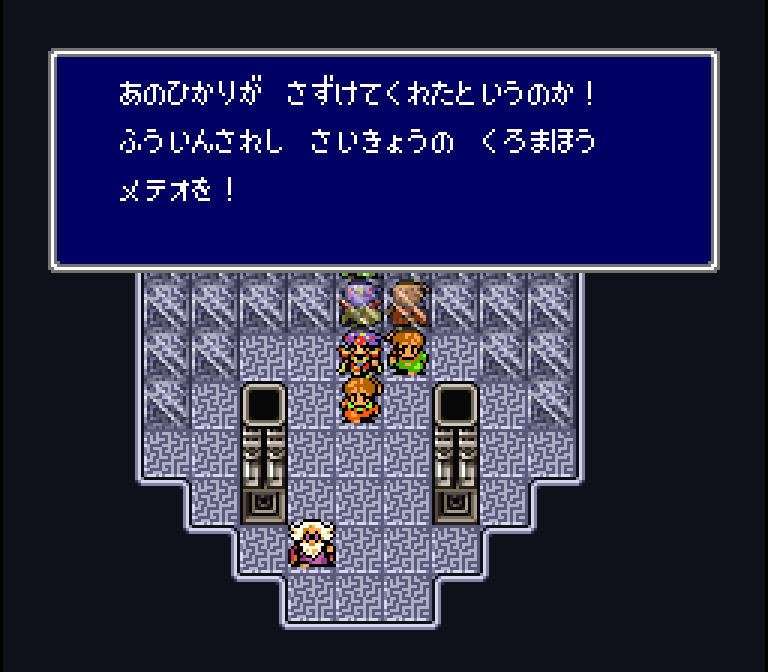 | 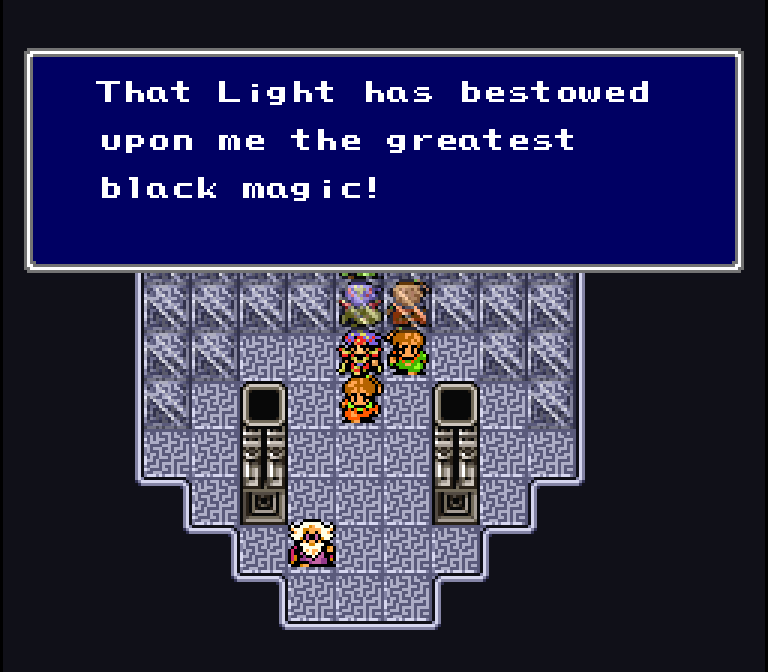 |
| Final Fantasy IV (Super Famicom) | Final Fantasy II (Super NES) |
The scene continues:
| Japanese Version (basic translation) | English Translation |
| Porom: Are you all right? | Porom: You all right? |
| Palom: So you really were serious about… | Palom: Right on! |
| Porom: Shh! | Porom: Hush! |
| Cecil: What is this sensation…? It feels oddly familiar… Just what was that voice…? | Cecil: What is this I am feeling? It’s so familiar. That voice… |
| Tella: O-oh! | Tellah: Oh, my! |
| Porom: Master Tella? | Porom: Master Tellah? |
| Tella: All the spells… I’ve remembered them! | Tellah: Yes! I remember the spells! |
| (Tella remembered all the spells he had forgotten!) | (Tellah recalled all the spells he had forgotten.) |
| Tella: !? | Tellah: !? |
| Me… | Me… |
| teo? | Meteo? |
| That light has granted it to me?! The ultimate black magic spell that was sealed away… Meteo?! | That light has bestowed upon me the greatest black magic! |
The points of interest here include:
- Palom says, “Right on!” in the English translation, but that’s not quite what was intended in the Japanese text. The Japanese line is a bit tough to phrase well in English, especially since it’s an incomplete sentence, but it seems to hint that it turns out that Cecil was telling the truth all along and really did want to become a Paladin (and had the ability to), meaning their fears were unwarranted.
- In the Japanese text, Tellah reiterates that Meteo was sealed away. This tidbit of info was again removed from the English translation for some reason.
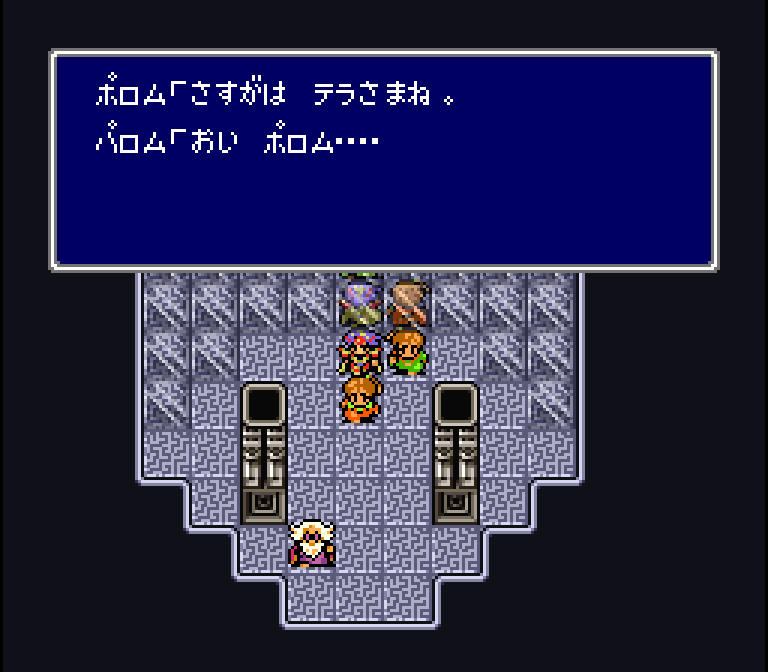 | 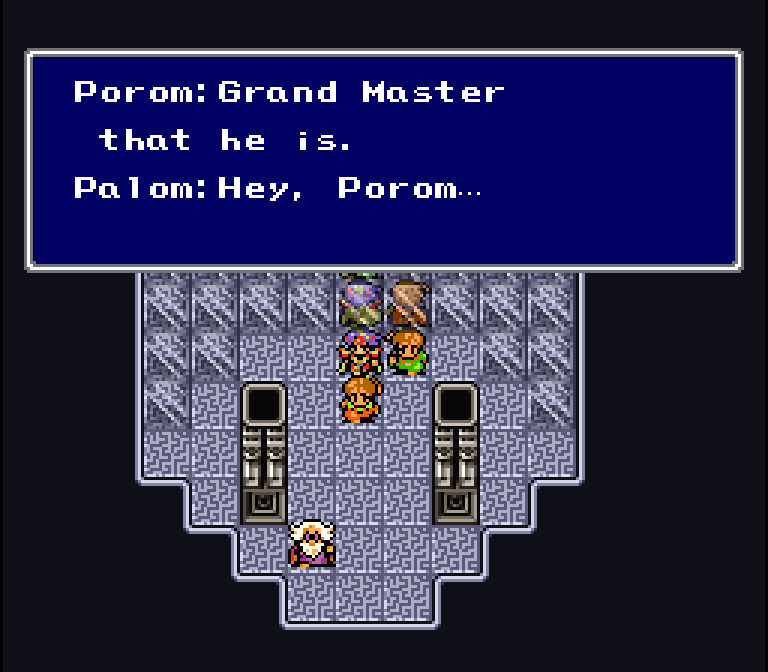 |
| Final Fantasy IV (Super Famicom) | Final Fantasy II (Super NES) |
And the scene concludes with this short bit:
| Japanese Version (basic translation) | English Translation |
| Porom: You truly are impressive, Master Tella. | Porom: Grand Master that he is. |
| Palom: Hey, Porom… | Palom: Hey, Porom… |
| Porom: Mr. Cecil… | Porom: Cecil… |
| Palom: The truth is, we were actually… | Palom: To tell you the truth, we… |
| Tella: Okay! Preparations are fully complete! | Tellah: Okay, now! All’s ready! |
| Let’s go see Golbeza!! | Lets go and get Golbez! |
| Tella: What are you doing, Cecil? Come, let us go! | Tellah: What are you doing, Cecil? We must go! |
| Cecil: Yeah… | Cecil: Yeah… |
| Cecil: Still, that light… it definitely called me… | Cecil: But that Light… it called me… |
| “My son”… | My son… |
| Palom: Ahh! Hold on! | Palom: Wait a sec! |
| Porom: Let us go, Mr. Cecil! | Porom: Let us go, Cecil! |
| Cecil: R-right! | Cecil: Okay. |
There’s not much here, but I’ll point out a few things:
- The first line has the word “sasuga” in it, which is always tough to translate well. In fact, I think we looked at this earlier in the game. Still, it’s interesting that the localization would say “Grand Master” like that. For the record, no such name or title exists anywhere in the Japanese version of the game – it’s a figment of the localization. Although there’s certainly no doubt that he’s a wizard of the highest order.
Incidentally, the J2E fan translation also says this exact same “Grand Master” line. This and many other lines copied basically straight from Final Fantasy II SNES’s script lead me to believe that someone on the project at some point decided they’d just take Final Fantasy II’s script to fill in certain holes or use Final Fantasy II’s script and just give it a light touching-up rather than actually retranslate the text… which was supposed to be the entire purpose of the project.
- The use of “wait a sec” is pretty native-style English. It’s possible a non-native speaker could use it, of course. I only point it out because it stands out so much from the normally awkward non-native writing used in the translation.
- One of Tellah’s translated lines has a typo: “Lets go”.
- Compared to the Japanese version, English-translation Cecil seems less enthusiastic at the very end.
Katana Densetsu
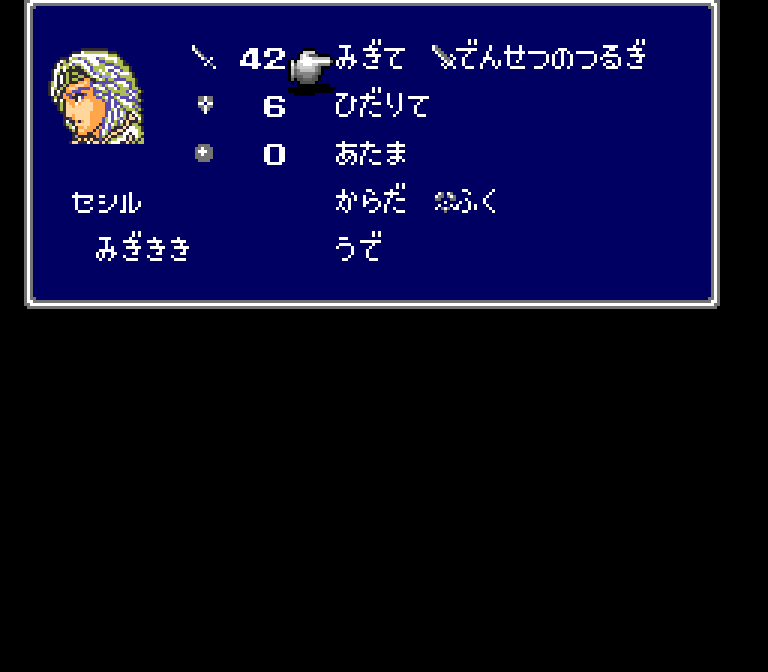 | 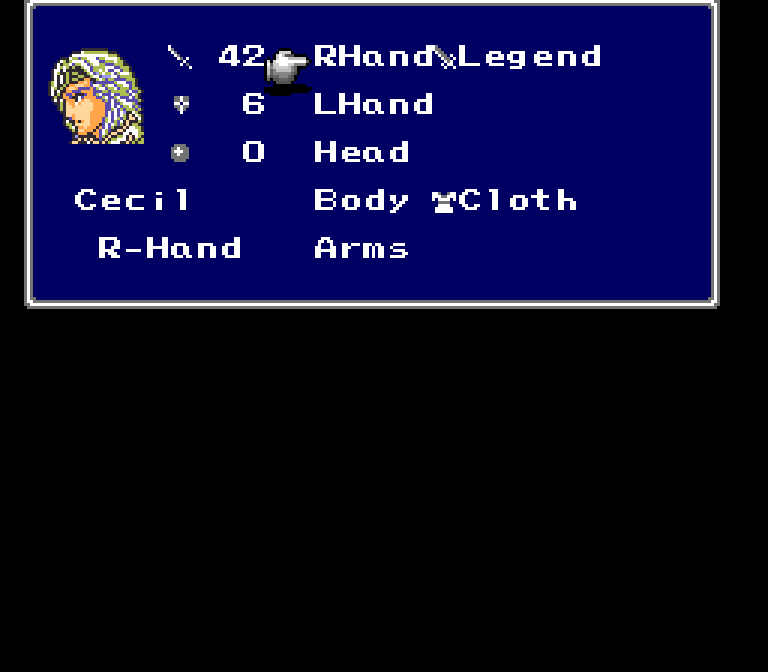 |
| Final Fantasy IV (Super Famicom) | Final Fantasy II (Super NES) |
Once Cecil becomes a Paladin, he has a new sword!
In Japanese, this is called the “Sword of Legend” or “Legendary Sword”. In English, it’s just “Legend” with the sword icon next to it.
This treatment is perfectly fine, but I thought it would be important to point out since later translations, which tend to be more flowery in tone, call it the “Mythgraven Blade”. Here’s a shot from the DS translation, for example:
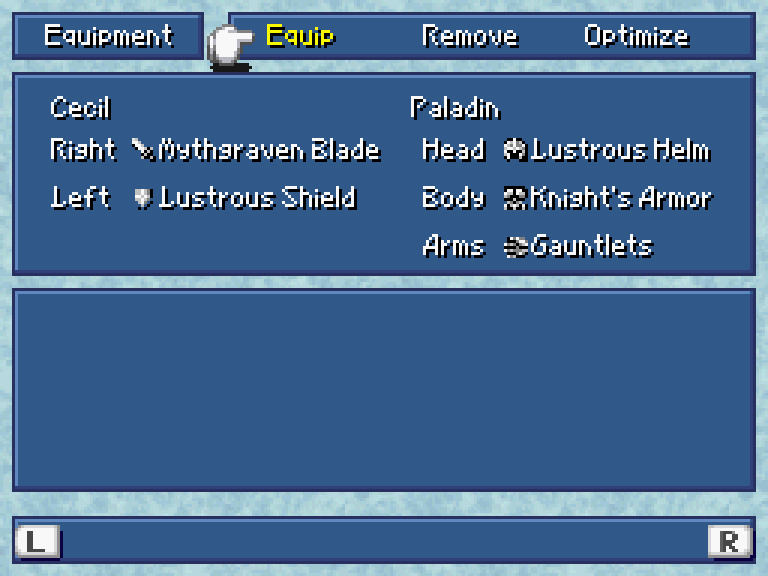
Not All the Spells
 | 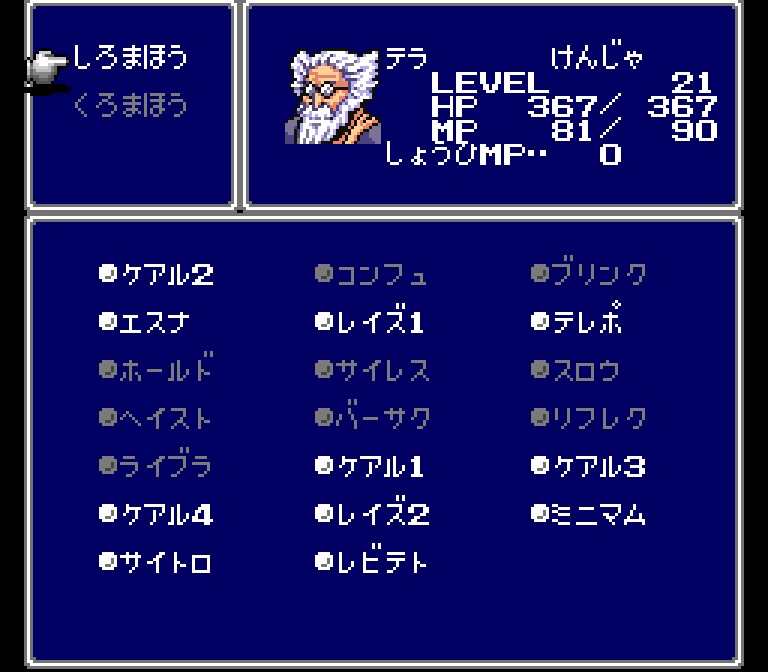 | 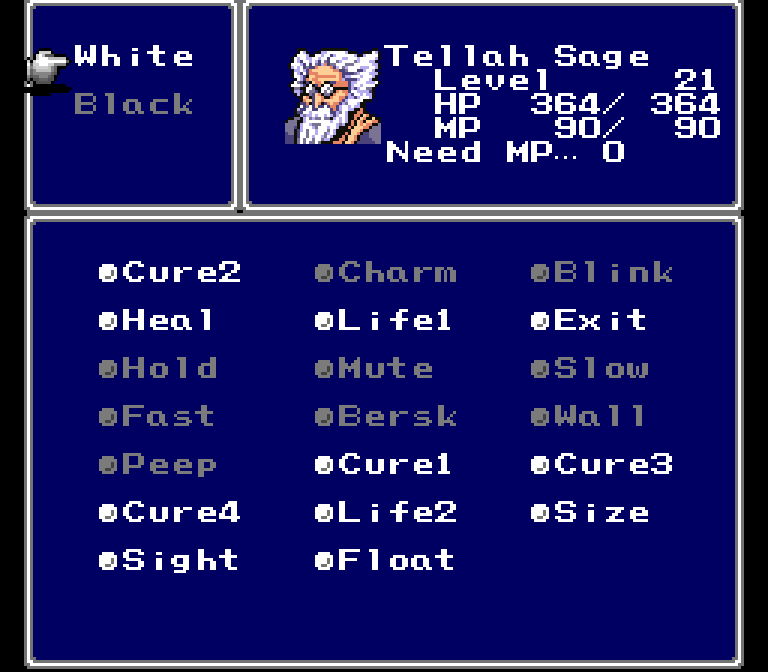 |
| Final Fantasy IV (Super Famicom) | Final Fantasy IV Easy Type (Super Famicom) | Final Fantasy II (Super NES) |
After the Paladin event, Tellah gains use of nearly all the black and white magic spells in the game.
On closer look, though, we see that he seems to be missing a few white magic spells in Final Fantasy IV Easy Type and Final Fantasy II. In particular, these spells:
- Protes / Proteth / Protect
- Shell
- Dispel
These spells were removed from everyone’s spell lists, not just Tellah’s. I’m sure they still exist in the code but were dummied out for Easy Type and Final Fantasy II. In fact, apparently an enemy near the very end of the game still has use of these spells, but the localization removes the little magic icons next to the names to hide the fact that they are actual spells you could’ve had.


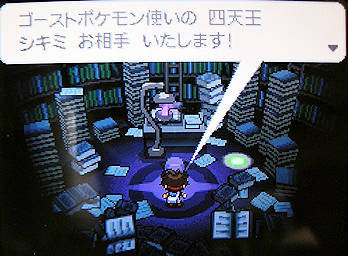
![press start to translate [Final Fantasy IV] press start to translate [Final Fantasy IV]](https://legendsoflocalization.com/wp-content/uploads/2019/08/bbenma.png)
Palom and Porom have a strong Bart and Lisa Simpson vibe to them. I have always loved Porom’s “oops” line in FFII. Like, sure, she’s the more mature and respectful of the two Mysidian twins, but she’s still just a little kid. It reads to me like she’s genuinely worked up about this threat to Tellah’s life, and in that state she accidentally blurts out something she regrets saying. It’s cute and fitting, and a nice bit of characterization for the otherwise always-superior goody-goody Porom.
The stations on Mt. Ordeals are a reference to the Stations of the Cross in Catholicism. The 3rd and 7th Stations are where Jesus fell on his path to his crucifixion.